Mitchell Hadley's Blog: It's About TV!, page 31
May 27, 2024
What's on TV? Wednesday, May 29, 1968

 Wait, we're back in the Twin Cities again this week. How did that happen? Well, never mind. One of the guests on The Mike Douglas Show is Lt. General Lew Walt, who served in World War II, Korea, and Vietnam, ultimately winding up as Assistant Commandant of the Marine Corps and a four-star general. He was considered one of the more successful generals in South Vietnam, securing and protecting a substantial number of villages, and working to win over the "hearts and minds" of Vietnamese citizens. He returned to the United States in 1967, and I'd imagine his appearance with Douglas was to give his views on how the war was going and what the future strategy should be.
Wait, we're back in the Twin Cities again this week. How did that happen? Well, never mind. One of the guests on The Mike Douglas Show is Lt. General Lew Walt, who served in World War II, Korea, and Vietnam, ultimately winding up as Assistant Commandant of the Marine Corps and a four-star general. He was considered one of the more successful generals in South Vietnam, securing and protecting a substantial number of villages, and working to win over the "hearts and minds" of Vietnamese citizens. He returned to the United States in 1967, and I'd imagine his appearance with Douglas was to give his views on how the war was going and what the future strategy should be.-2- KTCA (EDUC.) Morning 8:55 CLASSROOM—Education Afternoon 1:55 RACE RELATIONS—Education SPECIAL 2:25 CLASSROOM—Education Ch.s 2 is off from 2:40 to 4 P.M. 4:00 THE TEACHING ROLE 4:30 TO BE ANNOUNCED 5:00 KINDERGARTEN—Mrs. Marron 5:30 TEACHING ENGLISH—Education Evening 6:30 TO BE ANNOUNCED 7:00 BLACK VOICES—Discussion COLOR 8:00 LEGAL INSTRUCTION COLOR 8:30 AMERICAN SOCIAL HISTORY 9:00 POPULATION PROBLEM 10:00 NET JOURNAL—Report
-4- WCCO (CBS) Morning 6:00 SUMMER SEMESTER COLOR 6:30 SIEGFRIED—Children COLOR 7:00 CLANCY & CARMEN COLOR 7:30 CLANCY & WILLIE COLOR 8:00 CAPTAIN KANGAROO—Children COLOR 9:00 LIVE TODAY—Religion COLOR 9:05 MERV GRIFFIN—Variety COLOR Guests: Theodore Sorenson, Robert Clary, Orson Bean, Norm Crosby, Helen Gurley Brown 10:00 ANDY GRIFFITH—Comedy 10:30 DICK VAN DYKE—Comedy 11:00 11:25 LOVE OF LIFE—Serial COLOR NEWS—Joseph Benti COLOR 11:30 SEARCH FOR TOMORROW—Serial COLOR 11:45 GUIDING LIGHT—Serial COLOR Afternoon 12:00 NEWS—Dean Montgomery COLOR 12:20 SOMETHING SPECIAL COLOR 12:30 AS THE WORLD TURNS—Serial COLOR 1:00 LOVE IS A MANY SPLENDORED THING—Serial COLOR 1:30 HOUSE PARTY COLOR 2:00 TO TELL THE TRUTH—Game COLOR Guest panelist: Joanna Barnes. Host: Bud Collyer 2:25 NEWS—Douglas Edwards COLOR 2:30 EDGE OF NIGHT—Serial COLOR 3:00 SECRET STORM—Serial COLOR 3:30 BEVERLY HILLBILLIES 4:00 MIKE DOUGLAS—Variety COLOR Guests: Ed McMahon, Minnie Pearl, Lt. General Lew Walt, the Marine Jazz Combo 5:30 NEWS—Walter Cronkite COLOR Evening 6:00 NEWS—Dave Moore COLOR 6:15 WEATHER—Bud Kraehling COLOR 6:20 SPORTS—Hal Scott COLOR 6:30 LOST IN SPACE—Adventure COLOR 7:30 BEVERLY HILLBILLIES—Comedy COLOR 8:00 GREEN ACRES—Comedy COLOR 8:30 HE & SHE—Comedy COLOR 9:00 DOM DeLUISE—Comedy COLOR Guests: Timmie Rogers, Rita Gardner 10:00 NEWS SCENE COLOR 10:45 MOVIE—Drama COLOR “Foxfire” (1955)
-5- KSTP (NBC) Morning 6:15 DAVID STONE—Music COLOR 6:30 CITY AND COUNTRY COLOR 7:00 TODAY COLOR Guests: Sen. Fred Harris (D-Okla.), Chad Mitchell, Mike Epstein 9:00 SNAP JUDGMENT—Game COLOR Guests: Jane Morgan, Joe Garagiola 9:25 NEWS—Nancy Dickerson COLOR 9:30 CONCENTRATION COLOR 10:00 PERSONALITY—Game COLOR Celebrities: Jack Carter, Ethel Merman, Estelle Parsons. On-film: Robert Goulet 10:30 HOLLYWOOD SQUARES—Game COLOR Celebrities: Max Baer, Nanette Fabray, Paul Lynde, Jan Murray, Connie Stevens, Morey Amsterdam, Rose Marie, Wally Cox, Charley Weaver 11:00 JEOPARDY—Game COLOR 11:30 EYE GUESS—Game COLOR 11:55 NEWS—Edwin Newman COLOR Afternoon 12:00 NEWS—Gene Berry COLOR 12:10 WEATHER—Johnny Morris COLOR 12:15 DIALING FOR DOLLARS—Game COLOR 12:30 LET’S MAKE A DEAL COLOR 1:00 DAYS OF OUR LIVES COLOR 1:30 DOCTORS—Serial COLOR 2:00 ANOTHER WORLD COLOR 2:30 YOU DON’T SAY!—Game COLOR Guests: Julie Adams, Richard Long 3:00 MATCH GAME COLOR Guests: Alan King, Eydie Gorme. Host: Gene Rayburn 3:25 NEWS—Floyd Kalber COLOR 3:30 DIALING FOR DOLLARS—Game COLOR 4:30 OF LANDS AND SEAS—Travel COLOR 5:25 NEWS—Gene Barry COLOR 5:30 NEWS—Chet Huntley, David Brinkley COLOR Evening 6:00 NEWS—Bob Ryan COLOR 6:15 WEATHER—Johnny Morris COLOR 6:20 SPORTS—Al Tighe COLOR 6:30 VIRGINIAN—Western COLOR 8:00 KRAFT MUSIC HALL COLOR “Country Fair”: Host: Eddy Arnold. Guests: Anita Bryant, the Brothers Four, Gene Sheldon, John Byner 9:00 RUN FOR YOUR LIFE—Drama COLOR 10:00 NEWS—John MacDougall COLOR 10:15 WEATHER—Johnny Morris COLOR 10:20 SPORTS—Al Tighe COLOR 10:30 JOHNNY CARSON COLOR 12:00 HENRY WOLF—Discussion COLOR Guests: Rev. Eugene R. Fairweather, Lord Brown of Machrihanish, O.B.E.
-9- KMSP (ABC) Morning 7:30 77 SUNSET STRIP—Mystery 8:30 WEDDING PARTY COLOR 9:00 ROMPER ROOM COLOR 9:30 DICK CAVETT—Variety COLOR Guests: Angeline Butler, Cy Coleman 11:00 BEWITCHED—Comedy 11:30 TREASURE ISLE—Game COLOR Afternoon 12:00 DREAM HOUSE—Game COLOR 12:30 NEWS—Jerry Smith COLOR 1:00 NEWLYWED GAME COLOR 1:30 BABY GAME COLOR 1:55 CHILDREN’S DOCTOR COLOR 2:00 GENERAL HOSPITAL COLOR 2:30 DARK SHADOWS COLOR 3:00 DATING GAME COLOR 3:30 MOVIE—Western “The Storm Rider” (1957) 4:55 NEWS—Jerry Smith COLOR 5:00 NEWS—Frank Reynolds COLOR 5:30 McHALE’S NAVY—Comedy Evening 6:00 TRUTH OR CONSEQUENCES—Quiz COLOR 6:30 AVENGERS—Adventure COLOR 7:30 DREAM HOUSE—Game COLOR 8:00 MOVIE—Comedy “Wives and Lovers” (1963) 10:00 NEWS—Fahan, Steer COLOR 10:25 SPORTS—Tony Parker COLOR 10:30 JOEY BISHOP—Variety COLOR Guest: Ronnie Schell 12:00 NAKED CITY—Drama
11 WTCN (IND.) Morning 8:40 NEWS—Gil Amundson 8:45 KING AND ODIE—Cartoons 9:00 SEA HUNT—Adventure 9:30 TREASURE—Documentary COLOR 10:00 WOODY WOODBURY—Variety COLOR Guests: Charlton Heston, Suzy Parker, Chad Mitchell, Robert Clary, Nichelle Nichols 11:30 NEWS—Amundson, Martin Afternoon 12:00 LUNCH WITH CASEY—Children 1:00 MOVIE—Adventure “Rommel’s Treasure” (Italian-America; 1960) 2:30 MEL’S NOTEBOOK—Interview 3:00 VIRGINIA GRAHAM—Interviews COLOR Guests: Jeannie Arnold, Brenda Vaccaro, Leslie Rubinstein 3:30 PATTY DUKE—Comedy 4:00 POPEYE AND PETE—Children 4:30 CASEY AND ROUNDHOUSE 5:00 FLINTSTONES—Cartoon 5:30 GILLIGAN’S ISLAND—Comedy Evening 6:00 TWILIGHT ZONE—Drama 6:30 BURKE’S LAW—Mystery 7:30 PERRY MASON—Drama 8:30 ALFRED HITCHCOCK—Drama 9:00 MOVIE—Drama “All the Young Men” (1960) 11:00 NEWS—Stuart A. Lindman 11:15 WEATHER—Rodger Kent 11:20 SPORTS—Frank Buetel 11:30 HAVE GUN—WILL TRAVEL
TV
Published on May 27, 2024 05:00
May 25, 2024
This week in TV Guide: May 25, 1968
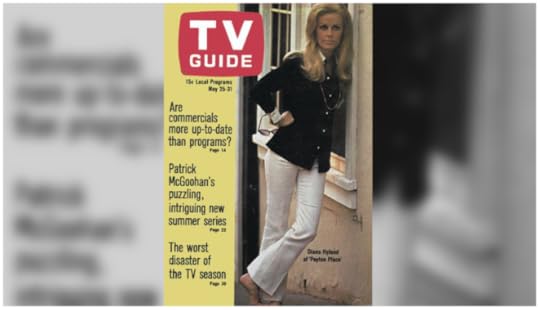
 In the long and occasionally glorious history of television, there have been many fiascos. Some of them, such as Turn-On and You're In the Picture, each of which ran for only one episode, have become synonymous with failure. The program which we are about to discuss, which TV Guide calls "The worst disaster of the TV season," is not one of them. In fact, it's likely you've never even heard of it. That doesn't make Edith Efron's autopsy of a story any less fascinating, though—after all, most train wrecks are.
In the long and occasionally glorious history of television, there have been many fiascos. Some of them, such as Turn-On and You're In the Picture, each of which ran for only one episode, have become synonymous with failure. The program which we are about to discuss, which TV Guide calls "The worst disaster of the TV season," is not one of them. In fact, it's likely you've never even heard of it. That doesn't make Edith Efron's autopsy of a story any less fascinating, though—after all, most train wrecks are.The program, a television play entitled Flesh and Blood, aired on NBC on January 26, 1968. There were high hopes for the program, "a powerful and compassionate drama of a contemporary American family": written by award-winning Broadway playwright William Hanley, directed by Oscar-nominee Arthur Penn, and starring Oscar-winner Edmond O'Brien and Emmy winners E.G. Marshall, Kim Stanley and Suzanne Pleshette, along with a very young Robert Duvall. NBC had paid Hanley the then-unheard-of sum of $112,500 for the script—the largest amount ever for a television script—and touted the coming special for the better part of a year.
In case the article's title didn't give it away, the show did not go over well. I love the pull quotes that Efron features—"a compression of enough emotional depression and disaster to sustain a soap-opera series through 1970" (New York Times), "a grim, depressing piece" (Boston Record American), "a catalog of calamities" (Philadelphia Inquirer), "an unrelieved chronicle of human misery" (Denver Post), "a numbing two-hour trickle of unspeakable secrets" (Time)—well, you get the idea.
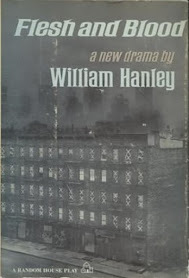 So, Efron asks: what went wrong? A number of things, as it turns out. For starters, NBC wanted a prestige program, and thought they could get it by outbidding Broadway—except, as Hanley himself points out, the show never was headed to the Great White Way. With its depressing subject matter, Hanley says, "[i]t wouldn't have lasted five minutes on Broadway." The network executives saw Hanley as an award-winning playwright, but his awards had been for off-Broadway work, and he'd never had a box-office hit. The cast, many of whom were going through personal problems of their own, never really learned the script, and often ad-libbed their lines. Most important, perhaps, was the grim story itself. Hanley, refreshingly candid about the whole thing, allows that "I do have a very dark vision of life" that is not for everyone.
So, Efron asks: what went wrong? A number of things, as it turns out. For starters, NBC wanted a prestige program, and thought they could get it by outbidding Broadway—except, as Hanley himself points out, the show never was headed to the Great White Way. With its depressing subject matter, Hanley says, "[i]t wouldn't have lasted five minutes on Broadway." The network executives saw Hanley as an award-winning playwright, but his awards had been for off-Broadway work, and he'd never had a box-office hit. The cast, many of whom were going through personal problems of their own, never really learned the script, and often ad-libbed their lines. Most important, perhaps, was the grim story itself. Hanley, refreshingly candid about the whole thing, allows that "I do have a very dark vision of life" that is not for everyone.The whole thing is a prime example of how network executives, through ignorance, hubris, arrogance, stupidity—for starters—can foul things up. One executive tells Efron, "Some people thought we shouldn't put it on. But we thought we could get away with it. What the hell, we'd paid for it, we'd publicized it. And any special will get you some praise." And they did get some; at least the critic Rex Reed liked it. Soon after, NBC would announce a policy change regarding their dramatic programming, signing an agreement with Prudential Life Insurance to produce "five original 'upbeat' dramas" in the coming season—dramas that will be "exciting, hopeful and affirmative."
And here is where we come to the moral of the story. Clearly we have a disaster here, and although there are many reasons why, pretty much everyone would agree that William Hanley wrote a flop. Conventional wisdom might suggest that this would signal the end of Hanley's career, at least when it comes to television.
But you'd be wrong.
William Hanley went on to write over two dozen TV scripts, winning two Emmys and being nominated for three others. He wrote the landmark TV movie Something About Amelia with Ted Danson, as well as adaptations of Tommy Thompson's bestseller Celebrity and Shana Alexander's bestseller Nutcracker: Money, Madness and Murder, and The Attic: The Hiding of Anne Frank. When he died in 2012 at age 80, his New York Times obituary describes him as an "uncommonly gifted writer" who "received critical acclaim as a Broadway and Off Broadway playwright in the 1960s and who later won Emmys for television scripts." Of Flesh and Blood, the newspaper that had described it as " emotional depression and disaster" merely noted that it had received "mixed reviews."
So let that be a lesson to you: failure does not have to be permanent. Time can heel all wounds (and, if we're lucky, wound all heels), and people have short memories. Flesh and Blood did not ruin William Hanley's career; it merely disappeared into the ether. He didn't give up, and neither should we.
l l l
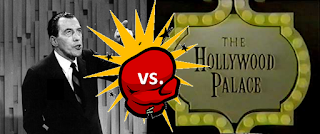 During the 60s, the Ed Sullivan Show and The Hollywood Palace were the premiere variety shows on television. Whenever they appear in TV Guide together, we'll match them up and see who has the best lineup..
During the 60s, the Ed Sullivan Show and The Hollywood Palace were the premiere variety shows on television. Whenever they appear in TV Guide together, we'll match them up and see who has the best lineup..Sullivan: Scheduled: Mike Douglas; Nancy Sinatra; Spanky and Our Gang; comedians Scoey Mitchell, Bobby Ransen, and Hendra and Ullett; the acrobatic Trio Rennos; the roller-skating Bredos; and the Muppets Puppets.
Palace: Co-hosts Steve Lawrence and Eydie Gorme introduce comics Tim Conway and Corbett Monica, dancers Szony and Claire, and the Mascotts, German head-balancing act. Tim portrays a square at a hippie love-in, and Corbett’s monolog concerns family life.
It's kind of an indifferent week here in variety row, with the headliners carrying the heavy load in both cases. Sullivan has Mike Douglas, who is, well, pleasant; and Nancy Sinatra, who is, well, a Sinatra; which means we have to depend on Spany and Our Gang and the Muppets. Over Palace way we have Steve and Eydie, Tim Conway, and Corbett Monica. It depends on what you like best, I suppose, but from where I see it, we have to go with Sullivan this week , or else Sundays will never be the same.
l l l
I suppose millions, if not billions, of words have been written about The Prisoner, Patrick McGoohan's legendary series that's part espionage, part sci-fi, part mystery, and completely compelling. I've contributed my share to the oeuvre over the years, and there's no need to go into more detail about it. But this week we get a unique opportunity to glimpse of the program before it becomes the legend; although it aired last year in England, it's about to make its American debut, and this week Joan Barthel talks to McGoohan—or, rather, listens to him talking—about what to expect from the series that, unlike Flesh and Blood, actually lives up to the hype.
McGoohan was given free rein (and a big budget) by Lew Grade and Associated Television, and in addition to being executive producer and star, he was also a part-time scriptwriter and director. In America, CBS, the network that aired McGoohan's previous Secret Agent, liked the idea of adding it to the regular fall schedule—provided a few changes were made. Michael Dann, VP of programming for the network, called it "the most extraordinary film I'd ever seen. It has style, taste, quality, and it’s quite sophisticated. But I told [McGoohan] that no matter how brilliant the production, the public likes to identify with a winner." And how did McGoohan react to that piece of advice? "He listened to me—he gave me a very understanding ear—but he was dedicated to this concept and I didn’t win my point."
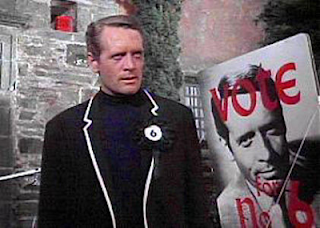 Barthel notes that what Dann called "dedication" has been seen by others as "stubbornness" and "intolerance," which he exhibited in their "interview," which she called "a fascinating example of a strong will at work, determining the direction the talk was to take." Indeed, many of her questions brought responses such as, "I don’t know" or "I certainly don’t wish to talk about that now." Regarding some of the overly metaphysical interpretations of the show, he says that "It would be a grave error to pretend that this is anything other than a piece of entertainment of a certain type." Nevertheless, it's clear he wants the series to say something about modern society. "I've always been obsessed with the idea of prisons in a liberal democratic society," he says. "I believe in democracy, but the inherent danger is that with an excess of freedom in all directions we will eventually destroy ourselves."
Barthel notes that what Dann called "dedication" has been seen by others as "stubbornness" and "intolerance," which he exhibited in their "interview," which she called "a fascinating example of a strong will at work, determining the direction the talk was to take." Indeed, many of her questions brought responses such as, "I don’t know" or "I certainly don’t wish to talk about that now." Regarding some of the overly metaphysical interpretations of the show, he says that "It would be a grave error to pretend that this is anything other than a piece of entertainment of a certain type." Nevertheless, it's clear he wants the series to say something about modern society. "I've always been obsessed with the idea of prisons in a liberal democratic society," he says. "I believe in democracy, but the inherent danger is that with an excess of freedom in all directions we will eventually destroy ourselves."The subject turns to America's obsession with polls, McGoohan says that "[t]he reason we're so concerned with these polls is that we're so desperately concerned with saying, 'We're free!' And I want to know, how free are we? I think we're being imprisoned and engulfed by a scientific and materialistic world. We're at the mercy of gadgetry and gimmicks; I'm making my living out of a piece of gadgetry, which is a television set, and anyone who says there aren't any pressures in it has never watched a commercial."
McGoohan himself rarely ventures out into that world other than to work, and when he does, he finds it "mechanized and computerized." "Computers have everything worked out for us. And we're constantly being numeralized. The other day I went through the number of units that an ordinary citizen over here is subject to, including license plate numbers and all the rest, and it added up to some 340 separate digits." McGoohan's character in The Prisoner, a former intelligence agent is kept captive by an unknown authority in an unknown place where people are known not by name but by number. is known by only one digit: Number 6. (He once said he chose the number because of its ambiguity, being the only digit that makes another digit when held upside-down.)
As for his program, McGoohan insists it isn't all that far-fetched. "What do you do with defectors, or with people who have top-secret knowledge of the highest order and who, for one reason or another, want out? Do you shoot them?" He says he knows better; "I know there are places where these people are kept. Not voluntarily, and in absolute luxury. There are three in this country—let someone deny it! I know about them because I know someone who used to be associated with the service."
The Prisoner was one of the most puzzling, most controversial—and most prophetic—television series ever. Its ambiguity and its failure to provide a definitive end to the series outraged many, enthralled others, and confused most everyone. And McGoohan wouldn't have had it any other way. "I just hope there are a couple of thoughts in it somewhere that relate to the things that are going on around us, to our situation at the moment. It will be interesting to see what viewers thing the symbols are. I will say this: There are, within it, answers to every single question that can be posed, but one can't expect an answer on a plate, saying, 'Here you are; you don't have to think; it's all yours; don't use your brain.'"
l l l
One of the reasons I tend to go long on some of these feature articles is that, as spring turns to summer, original programming transitions into reruns, with the odd summer-replacement series thrown in. There are exceptions, though, and one of those shows up on Thursday, May 30. In 1968, Memorial Day was still celebrated on May 30; the holiday wasn't moved to its current fourth-Monday-in-May status until 1971. Back then, Memorial Day meant one thing for many people: the Indianapolis 500, the "Greatest Spectacle in Racing." (And don't think I'm biased because I live in Indiana; I felt that way even back in 1968.)
 Besides the date, there were other things different about 1968. The race wasn't televised live, but instead was presented in highlight form on Wide World of Sports a couple of weeks later. No, if you wanted to follow the race, there were only two ways to do it: either on the radio, or via closed-circuit in a movie theater. In lieu of live race coverage, we have something else in store: the Indianapolis 500 Festival Parade (Thursday, 4:00 p.m., syndicated), taped Tuesday evening, with Garry Moore alongside Sid Collins, the famed radio "Voice of the 500." Unlike so many things, the 500 Festival Parade is still around today, and still on TV, carried by Peacock the day before this year's race.
Besides the date, there were other things different about 1968. The race wasn't televised live, but instead was presented in highlight form on Wide World of Sports a couple of weeks later. No, if you wanted to follow the race, there were only two ways to do it: either on the radio, or via closed-circuit in a movie theater. In lieu of live race coverage, we have something else in store: the Indianapolis 500 Festival Parade (Thursday, 4:00 p.m., syndicated), taped Tuesday evening, with Garry Moore alongside Sid Collins, the famed radio "Voice of the 500." Unlike so many things, the 500 Festival Parade is still around today, and still on TV, carried by Peacock the day before this year's race.Elsewhere, Leonard Bernstein hosts a pop quiz on music on Sunday's Young People's Concert (3:30 p.m., CBS); the quiz covers "identification, observation, terminology, TV series, and famous composers, from Bach to the Beatles." Also on Sunday, Max von Sydow stars in a made-for-TV version of The Diary of Anne Frank (8:00 p.m., ABC), with Diana Davila as Anne, and a supporting cast including Lilli Palmer, Theodore Bikel, Viveca Lindfors, Marisa Pavan, and Donald Pleasence.
Tuesday night is the critical Oregon Primary, and all three networks plan late-night coverage. Richard Nixon has been strong in the Republican primaries so far, but Ronald Reagan finished strong in Nebraska, and is hoping for momentum to take him to his home state of California. On the Democratic side, RFK has the momentum, while Hubert Humphrey is skipping the primaries; Eugene McCarthy has refused to withdraw, and many think that this is part of his bid for the vice presidential nomination. In the event, Nixon wins the GOP vote, while McCarthy scores an upset victory for the Democrats. California now becomes the critical primary for the Democrats, and Kennedy heads there to put on an all-out effort.
And Ethel Merman is the guest on Friday's Tarzan (6:30 p.m., NBC). I wonder who's louder—Tarzan's yell, or the Merm when she hits the high notes?
l l l
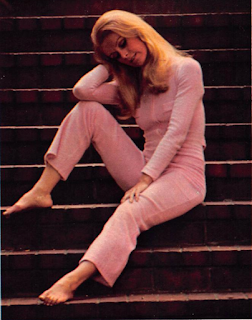 This week's cover girl is Diana Hyland, currently appearing as "the nymphomaniacal drunk minister's wife" in ABC's prime-time soap Peyton Place, and author Burt Prelutsky is in love with her. She's got it all: a dazzling smile, lovely blue eyes, and legs that won't quit. She's interesting, too; she believes in flying saucers, said good evening to Nikita Khrushchev at the UN and was winked at by Fidel Castro, and has remained 27 for the last five years*, the previous time when she was interviewed by TV Guide. "I lied then," she tells Prelutsky.
This week's cover girl is Diana Hyland, currently appearing as "the nymphomaniacal drunk minister's wife" in ABC's prime-time soap Peyton Place, and author Burt Prelutsky is in love with her. She's got it all: a dazzling smile, lovely blue eyes, and legs that won't quit. She's interesting, too; she believes in flying saucers, said good evening to Nikita Khrushchev at the UN and was winked at by Fidel Castro, and has remained 27 for the last five years*, the previous time when she was interviewed by TV Guide. "I lied then," she tells Prelutsky.*According to the always-reliable Wikipedia, Hyland was born in 1936, which means she was in fact 27 —in 1963. She told the truth then; she's lying now.
She's a dedicated actress, and a successful one—"everything I've ever tried I've done well," she says. Her Peyton Place director, Walter Doniger, calls her "an elegant, bright, witty dame" who's also svelte, sophisticated, and a nonconformist. In fact, she only has two vices: she owns 200 pairs of shoes, and she smokes three packs of cigarettes a day.
I don't know if that last vice is significant or not. Flash forward to 1977: she's in a happy relationship with John Travolta, she's playing Dick Van Patten's wife in Eight Is Enough—and she's diagnosed with breast cancer. She dies in March of that year, aged 41.
l l l
The Teletype tells us that Elvis Presley will be highlighting a special for NBC. I suspect they're talking about this. The rest, as they say, is history.
l l l
Finally, is it possible that the most interesting item in this week's issue is not an article, but an advertisement?
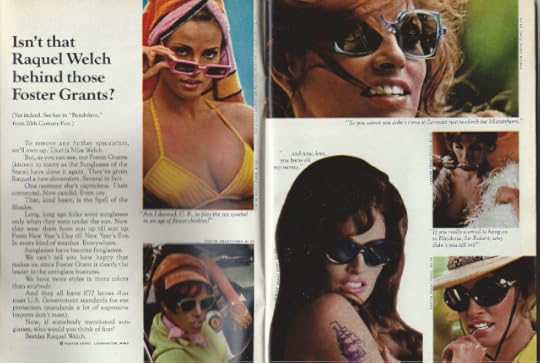
Hmm. Could be. TV
Published on May 25, 2024 05:00
May 24, 2024
Around the dial

 We'll begin this week at Comfort TV, where David asks a question that's both practical and existential:
how much TV is too much?
It speaks to not only the quantity but the quality of what's available out there nowadays, and leads to another question: what has television become, and (not rhetorically) what purpose does it serve? I think this could well be the beginning of an important discussion that's going to have to take place at some time or other, before the industry winds up consuming itself. As so many revolutions do.
We'll begin this week at Comfort TV, where David asks a question that's both practical and existential:
how much TV is too much?
It speaks to not only the quantity but the quality of what's available out there nowadays, and leads to another question: what has television become, and (not rhetorically) what purpose does it serve? I think this could well be the beginning of an important discussion that's going to have to take place at some time or other, before the industry winds up consuming itself. As so many revolutions do.And now, on to a lighter note: the bottle from which Barbara Eden pops out in I Dream of Jeannie is currently on display at the Smithsonian Museum's National Museum of American History, and Smithsonian Magazine uses the occasion to look at the history contained in Jeannie , as well as its legacy.
Travalanche celebrates the Peggy Cass Centennial . For those of you my age, you'll remember her as a staple of the Goodson-Todman shows, especially To Tell the Truth (where she appeared over one thousand times), but you'll see that there was more to her than just playing games.
You'll recall how Coronet Blue ended without answering the main question of what the phrase "Coronet Blue" actually meant, but that's not the only series to leave viewers hanging. At Television Obscurities, the creator of the cancelled series So Help Me Todd tells us how that series would have ended .
Terence pays tribute to the late Dabney Coleman at A Shroud of Thoughts. Coleman, who died last week aged 92, was known for playing characters you loved to hate, and as we all know, it takes a lot of talent to do that for as long as he does.
At A View from the Junkyard, Roger and Mike compare notes on " The Interrogators ," a Steed/Tara episode of The Avengers, and while we all know how fantastic some of the plots for this show can be (especially at this point), this is a surprisingly tense one that holds together well.
Rutland Weekend Television is the latest review from John at Cult TV Blog. It ran from 1975-76, parodying television of the time, and if you like Monty Python, you'll like this. Furthermore, if you like the shows that John writes about, you'll like this. I can't think of a better recommendation. TV
Published on May 24, 2024 05:00
May 22, 2024
Realism vs. plausibility
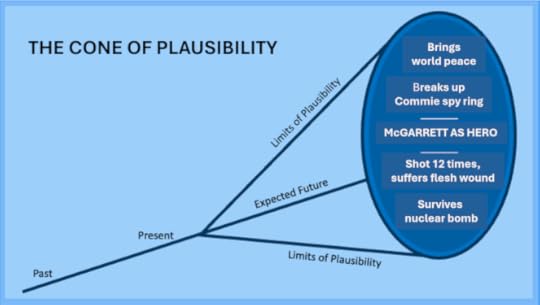
 Back in the days when the classic version of Hawaii Five-0 was part of our regular Thursday night viewing, there was a span of a few weeks during which we saw Steve McGarrett blown up on a boat (no significant injuries), splashed in the face with gasoline (which didn't keep him from shooting the perp), blown up in a car (the lasting effects of which were mainly confined to the guy who ordered the hit on McGarrett), and variously shot at, punched, and targeted for mayhem. It's nice to know that none of this got in the way of our hero catching the killer by the end of the hour, including cases in which I'm fairly sure the Hawaii State Police wouldn't have jurisdiction. If, there is, the Hawaii State Police even existed, which they don't.
Back in the days when the classic version of Hawaii Five-0 was part of our regular Thursday night viewing, there was a span of a few weeks during which we saw Steve McGarrett blown up on a boat (no significant injuries), splashed in the face with gasoline (which didn't keep him from shooting the perp), blown up in a car (the lasting effects of which were mainly confined to the guy who ordered the hit on McGarrett), and variously shot at, punched, and targeted for mayhem. It's nice to know that none of this got in the way of our hero catching the killer by the end of the hour, including cases in which I'm fairly sure the Hawaii State Police wouldn't have jurisdiction. If, there is, the Hawaii State Police even existed, which they don't.Even if you're not in Hawaii, though, you can still repeat this pattern in most classic TV shows of this kind: Mannix gets shot at and beaten up pretty much every week, with no symptoms of post-concussion trauma (expect a future revival of the series to be sponsored by the NFL), and I think that every cop on TV has shot at least a couple of people in every episode without even being put on paid leave, let alone going before the grand jury. Does this bother my viewing? Not in the least! Yet put me in front of a show like Law and Order or Chicago P.D., and I'd spend every moment of forced viewing complaining about everything from inadmissible confessions to the likelihood of a police detective being able to afford living in a Manhattan loft without accepting some kind of graft from the syndicate.
Therefore, the question before the house is why I demand certain things from current television shows, while I let other things go in the classic genre. Is it selective enforcement of logic, or is it merely a symptom of something deeper?
l l l
My theory, and that's all it is, is a combination of original thought plus ideas cribbed from sources I can no longer locate, so if you're one of those sources looking for credit, forgive me for swiping your ideas. (And let me know, so I can do it again.)
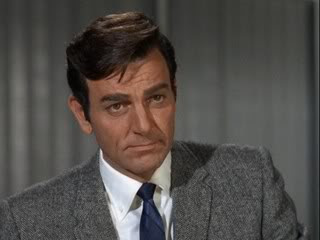 You don't really expect me to buy that, do you?I could probably write an entire book on this, but in brief, my theory is that classic television didn't attempt to create the same level of "realism" that exists in today's shows. Instead, the main characters— McGarrett and Mannix, to name a couple— represented archetypes, symbols of something greater than simply an individual character on a show. I recall reading somewhere that Mike Connors, the actor who played Joe Mannix, admitted that his type of private detective, a throwback to Spade and Marlowe and the rest, had already been gone for decades by the time the series premiered in the late 1960s. I've read elsewhere that the life of an actual private detective is, for the most part, pretty dull; most of them have never shot anyone, and they're much more likely to investigate an employee accused of dipping a finger in the till to checking out a scandalous murder that invariably introduces them to a bevy of glamorous and deadly femme fatales.
You don't really expect me to buy that, do you?I could probably write an entire book on this, but in brief, my theory is that classic television didn't attempt to create the same level of "realism" that exists in today's shows. Instead, the main characters— McGarrett and Mannix, to name a couple— represented archetypes, symbols of something greater than simply an individual character on a show. I recall reading somewhere that Mike Connors, the actor who played Joe Mannix, admitted that his type of private detective, a throwback to Spade and Marlowe and the rest, had already been gone for decades by the time the series premiered in the late 1960s. I've read elsewhere that the life of an actual private detective is, for the most part, pretty dull; most of them have never shot anyone, and they're much more likely to investigate an employee accused of dipping a finger in the till to checking out a scandalous murder that invariably introduces them to a bevy of glamorous and deadly femme fatales.But would we watch a show like that? Probably not, unless it was a reality show on Discovery.
From the get-go then, a show like Mannix was never intended to be that realistic. You might see him bleed from the corner of his mouth, but for as violent a show as it was said to be in the day, you see more gore in the average trailer for a Scorsese or Tarentino movie. As such, while it was far more serious and deeper than, say, a cartoon, you were meant to watch it for something other than hyper-realism. From the simple good-vs-evil showdown to a commentary on current events to an allegory of the human condition, these shows were trying to sell you something that was not meant to be believable in the small bits, just the bigger ones. Call it a non-science fiction form of fantasy, in which heroes can be shot, beaten, and subjected to all manner of abuse that the human body was never intended to endure, all in pursuit of the larger goal of entertainment, with perhaps a message or two on the side.
What these shows often did have going for them, though, was logic. Take Mission: Impossible, for example. Could there be a government agency that really comes up with the kind of intricate plots for which the IMF team was famous, composed of incredibly beautiful women (Barbara Bain) and darkly handsome men (the rest of them), with a success rate of 100%? I can't say for certain, but I suspect not. And yet if you try to watch Mission: Impossible with an eye toward that kind of realism, you're done for. What you do find, however, is an exceptionally logical plot. Once you suspend a certain level of disbelief, you find that every element of this week's scheme makes sense and flows logically from one element to the next. If there is a roadblock that pops up, it's perfectly reasonable to think that the minds responsible for cooking up such a plan in the first place could ad-lib their way out of any trouble. Think of it as improv theater for the national security set, and you've got it made.
In contrasting these shows with the fare served up today, I describe the difference in one phrase: realism is not plausibility. You may disagree with me on this, but I believe the contrast between realism and plausibility is more than a distinction without a difference. If you watch an episode of any given police procedural today, you find out that people do, in fact, bleed when they're punched or shot, and that the world in general is a messier place than it looked back when. Fine.
But in other ways, these shows seem far less plausible than their counterparts from the olden days. When I look at these impossibly hip detectives, with their incredibly ability to tap into virtually any computer system in the known universe in less time than it takes for this laptop to boot up and go through a virus scan, I have to wonder. When I see them living in the incredible lofts I mentioned earlier, I wonder why Internal Affairs isn't looking into their finances. When I see a celebrity "consultant" like Richard Castle (remember him?) allowed to not only sit in on interrogations but ask questions as well, I wonder what the accused's attorney is going to say about this in court.
OK, you're thinking, I get it. You don't like what's on TV today. (Not completely true, but we'll let it pass for now.) You prefer the old shows to the new ones. (I'll readily plead guilty to that.) But aren't you trying to have it both ways? I don't think so, and here's my explanation as to why.
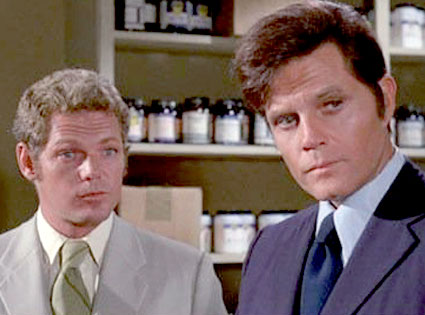 The idealized policeman?In an attempt to make today's characters deeper, more realistic, and often with a deep psychological backstory that gets parceled out in drips and drops via flashback, the show's creators make it that much harder to view them as mythic archetypes. Whereas the classic Steve McGarrett was a stand-in for the entire system of American justice, the McGarrett of the reboot was just another hot-shot detective with a hipster wardrobe and a military past that occasionally sends him into places like North Korea. That's when you get to the "give me a break" point in a show, because you're being asked to believe something that just isn't plausible, and in doing so it doesn't matter how grimy the city looks, or how much blood flows from someone's bullet wounds.
The idealized policeman?In an attempt to make today's characters deeper, more realistic, and often with a deep psychological backstory that gets parceled out in drips and drops via flashback, the show's creators make it that much harder to view them as mythic archetypes. Whereas the classic Steve McGarrett was a stand-in for the entire system of American justice, the McGarrett of the reboot was just another hot-shot detective with a hipster wardrobe and a military past that occasionally sends him into places like North Korea. That's when you get to the "give me a break" point in a show, because you're being asked to believe something that just isn't plausible, and in doing so it doesn't matter how grimy the city looks, or how much blood flows from someone's bullet wounds.Part of this, I suppose, is due to the growth of ensemble television, and the concurrent fact that casting a single actor as the star of a regular series, a la Mannix, with only a supporting cast, would probably be prohibitively expensive, unless you're HBO or Netflix. Ensembles rarely leave room for mythological giants in their midst. But I do think I'm on to something here. I don't get upset when something unrealistic happens to the protagonist in one of my classic TV shows, because I don't view him as simply an individual—he's more than that. I don't know if there's ever been a lawyer like Perry Mason in real life, but I also don't know of a better ambassador for what the American legal system should be than Mason. A show like The Good Fight may present a more realistic view of the courtroom, but I don't think it would inspire you to realize just how perfect our system of justice should be.* Likewise, when I read the late Efrem Zimbalist Jr. discuss how many FBI agents told him they were inspired to join the agency because of his show, I ask myself if that could happen today. Note that I don't say it couldn't happen, but I can't help thinking you'd be more likely to sign up for N.C.I.S. in order to play with the cool computers and meet goth scientists.
*Yes, I know it isn't that way now and probably never was, but it thrills the imagination in the same way that the Declaration of Independence and the Constitution make the heart skip a beat: we may not follow either of them today, but that doesn't make their principles any the less stirring.
Archetypes and myths were the stuff of which heroes were made. Realistically, we tell ourselves, heroes like that don't exist, or are rarely found, which is why we don't find them on TV. We don't believe in heroes that much, or in anything else for that matter. We're too cynical, too knowing, to with-it to fall for that claptrap. That makes it that much harder to sell the kind of hero I talk about here, the one who seems oblivious to things that would stop mere mortals. And perhaps that does give us a more realistic view of the world, albeit a less interesting one.
I don't really know if I've made a dent in my theory; I feel I've spent all my time setting up arguments that could feel superficial because I haven't built them out far enough, and any one of you might be able to tear it apart with well-founded arguments of your own, ones that might be both realistic and plausible. Maybe it does take a book to do it justice. (Unless Joseph Campbell already covered it in a chapter of one of his.) But when that book does come out, you'll probably be more likely to find it in the sociology area than television, because in the end this discussion isn't really about television at all. And if you have anything to add to it, I promise I'll mention you in the index. TV
Published on May 22, 2024 05:00
May 20, 2024
What's on TV? Thursday, May 26, 1966

 It's an election year in California, as we can see from the half-hour paid political broadcast on behalf of Los Angeles' controversial and outspoken mayor, Sam Yorty, who's running for governor of California. (It's seen at different times on both KTVU and KNTV.) Although Yorty was a Democrat, he endorsed Richard Nixon for president in 1960, and was a strong supporter of the Vietnam War; after the 1965 riots, he challenged the incumbent, Pat Brown, for the Democratic nomination for governor. Yorty lost handily to Brown in the primary; Brown, in turn, lost the election to Ronald Reagan in a landslide, while Yorty appeared with Reagan at the victory celebration. All very interesting to be sure, but how about that 30-minute political commercial? I remember them from back in the day, but can you imagine anyone sitting still for one today? These listings, obviously, are from the Northern California edition.
It's an election year in California, as we can see from the half-hour paid political broadcast on behalf of Los Angeles' controversial and outspoken mayor, Sam Yorty, who's running for governor of California. (It's seen at different times on both KTVU and KNTV.) Although Yorty was a Democrat, he endorsed Richard Nixon for president in 1960, and was a strong supporter of the Vietnam War; after the 1965 riots, he challenged the incumbent, Pat Brown, for the Democratic nomination for governor. Yorty lost handily to Brown in the primary; Brown, in turn, lost the election to Ronald Reagan in a landslide, while Yorty appeared with Reagan at the victory celebration. All very interesting to be sure, but how about that 30-minute political commercial? I remember them from back in the day, but can you imagine anyone sitting still for one today? These listings, obviously, are from the Northern California edition.-2- KTVU (SAN FRANCISCO-OAKLAND) (IND.) Morning 9:30 RELIGION TODAY—Catholic 10:00 NEWS—Sydney Chatton 10:30 JACK LA LANNE COLOR 11:00 ROMPER ROOM—Children Afternoon 12:00 STAR PERFORAMNCE—Drama “The Adolsecent” 12:30 NEWS 12:35 I WANT TO KNOW—Mel Venter 1:00 DIVORCE COURT—Drama 2:00 MOVIE—Mystery “Circle of Danger” (1951) 3:25 NEWS 3:30 CAPTAIN SATELLITE—Children 4:30 FIREBALL XL-5—Children 5:00 SUPERMAN—Adventure 5:30 THREE STOOGES—Comedy Evening 6:00 STINGRAY—Children COLOR 6:30 WOODY WOODPECKER COLOR 7:00 WONDERS OF THE WORLD COLOR 7:30 AMERICA!—Travel COLOR 8:00 ACROSS THE SEVEN SEAS COLOR 8:30 KINGDOM OF THE SEA COLOR 9:00 DANGER MAN—Mystery 9:30 RICHARD DIAMOND—Mystery 10:00 NEWS—Helmso, Cordell, Mann 10:30 POLITICAL TALK—Democratic Los Angeles Mayor Samuel W. Yorty, candidate for governor 11:00 MOVIE—Drama “Les Miserables" (1935)
-3- KCRA (SACRAMENTO) (NBC) Morning 5:55 FARM NEWS COLOR 6:00 RHYME AND REASON 7:00 TODAY COLOR Guests: Fess Parker, John Henry Faulk, Gideon Hausner 9:00 EYE GUESS COLOR 9:25 NEWS—Edwin Newman 9:30 CONCENTRATION 10:00 MORNING STAR—Serial COLOR 10:30 PARADISE BAY—Serial COLOR 11:00 JEOPARDY COLOR 11:30 LET’S PLAY POST OFFICE—Game COLOR 11:55 NEWS—Floyd Kalber Afternoon 12:00 NEWS—Boggs, Biondi 12:25 NEWS 12:30 DAYS OF OUR LIVES COLOR 1:00 DOCTORS—Serial 1:30 ANOTHER WORLD—Serial 2:00 YOU DON’T SAY!—Game COLOR Celebrities: Ruta Lee, John Astin 2:30 MOVIE—Drama COLOR “Hippodrome” (German; 1960) 4:00 MOVIE—Comedy Time approximate. “Love and Learn” (1947) 5:30 TRAVENTURE THEATRE COLOR Evening 6:00 NEWS—Chet Huntley, David Brinkley COLOR 6:30 NEWS COLOR 7:30 LONDON PALLADIUM SPECIAL COLOR Guests: Roger Moore, Millicent Martin, Kathy Kirby, Roy Castle, Gene Claude, Tommy Cooper, the Paddy Stone Dancers 8:30 LAREDO—Western COLOR 9:30 MICKIE FINN’S—Music COLOR Guest: Keely Smith 10:00 DEAN MARTIN—Variety COLOR Guests: Polly Bergen, Buddy Greco, Stanley Holloway, Bill Dana, Rowan and Martin 11:00 NEWS—Duke, Boyd COLOR 11:30 TONIGHT—Variety COLOR Guest host: Jerry Lewis 1:00 NEWS COLOR
-4- KRON (SAN FRANCISCO-OAKLAND) (NBC) Morning 6:25 FARM NEWS 6:30 PROFILE—San Diego State 7:00 TODAY COLOR Guests: Fess Parker, John Henry Faulk, Gideon Hausner 9:00 EYE GUESS COLOR 9:25 NEWS—Edwin Newman 9:30 CONCENTRATION 10:00 MORNING STAR—Serial COLOR 10:30 PARADISE BAY—Serial COLOR 11:00 JEOPARDY COLOR 11:30 LET’S PLAY POST OFFICE—Game COLOR 11:55 NEWS—Floyd Kalber Afternoon 12:00 LET’S MAKE A DEAL—Game COLOR 12:25 NEWS 12:30 DAYS OF OUR LIVES COLOR 1:00 DOCTORS—Serial 1:30 ANOTHER WORLD—Serial 2:00 YOU DON’T SAY!—Game COLOR Celebrities: Ruta Lee, John Astin 2:30 MATCH GAME COLOR Celebrities: Mitch Miller, Carol Lawrence 2:55 NEWS 3:00 BREAKING POINT—Drama 4:00 DECEMBER BRIDE—Comedy 4:30 MAYOR ART—Children 5:30 SEA HUNT—Adventure Evening 6:00 NEWS—Chet Huntley, David Brinkley COLOR 6:30 NEWS—Bron, Jensen, Fleming 6:55 NEWS 7:00 WESTERNERS—Drama COLOR 7:30 LONDON PALLADIUM SPECIAL COLOR Guests: Roger Moore, Millicent Martin, Kathy Kirby, Roy Castle, Gene Claude, Tommy Cooper, the Paddy Stone Dancers 8:30 LAREDO—Western COLOR 9:30 MICKIE FINN’S—Music COLOR Guest: Keely Smith 10:00 DEAN MARTIN—Variety COLOR Guests: Polly Bergen, Buddy Greco, Stanley Holloway, Bill Dana, Rowan and Martin 11:00 NEWS 11:30 TONIGHT—Variety COLOR Guest host: Jerry Lewis 1:00 INTERNATIONAL DETECTIVE 1:30 NEWS
-5- KPIX (SAN FRANCISCO-OAKLAND) (CBS) Morning 6:00 SUMMER SEMESTER Western Religious Trends: “Athens and Jerusalem” 6:30 FRONTIERS OF SCIENCE 7:00 NEWS—Jim Anderson 7:30 NEWS—Mike Wallace 7:55 FILM SHORT 8:00 CAPTAIN KANGAROO 9:00 I LOVE LUCY 9:30 McCOYS—Comedy 10:00 ANDY GRIFFITH 10:30 DICK VAN DYKE—Comedy 11:00 LOVE OF LIFE 11:25 NEWS 11:30 SEARCH FOR TOMORROW—Serial 11:45 GUIDING LIGHT—Serial Afternoon 12:00 NEWS 12:30 AS THE WORLD TURNS—Serial 1:00 PASSWORD—Game Celebrities: Lee Remick, Peter Lawford. Host: Allen Ludden 1:30 HOUSE PARTY COLOR Guest: James Peterson 2:00 TO TELL THE TRUTH 2:25 NEWS—Douglas Edwards 2:30 EDGE OF NIGHT 3:00 SECRET STORM 3:30 JOHN B. TUCKER—Variety 4:00 MIKE DOUGLAS—Variety Guests: Hugh Hefner, Prof. Bergen Evans, José Feliciano 5:30 TWILIGHT ZONE—Drama Evening 6:00 NEWS 6:30 NEWS—Walter Cronkite 7:00 ONE STEP BEYOND—Drama 7:30 MUNSTERS—Comedy 8:00 GILLIGAN’S ISLAND COLOR 8:30 MY THREE SONS COLOR 9:00 MOVIE—Comedy COLOR Thursday Night Movie: “The Wackiest Ship in the Army” (1960) 11:00 NEWS 11:20 MERV GRIFFIN—Variety Guests: B.S. Pulley, Les Poupée de Paris Puppet Theatre 12:50 MOVIE—Melodrama “Among the Living” (1941)
-6- KVIE (SACREMENTO) (EDUC) Afternoon 5:30 TIME FOR MUSIC—Lessons 5:45 BETTY B—Music Evening 6:00 SIERRA CLUB FILMS 6:30 STOCK MARKET REPORT 6:35 MUSICAL PORTRAITS 7:00 WHAT’S NEW—Children 7:30 NEW COMERS--Panel 8:00 PROBE—Dr. Albert E. Burke 8:30 PROBLEM OF BEING MAN 9:00 OPEN END—David Susskind Guest: Dean Rusk 10:00 CONCERT—San Francisco
-7- KGO (SAN FRANCISCO-OAKLAND) (ABC) Morning ALL-NIGHT MOVIE—Continued 5:45 LET’S TALK REAL ESTATE 6:00 CARTOON FACTORY 6:30 A.M.—Dunbar, Fleming, Bentley 8:30 GYPSY ROSE LEE—Panel Guests: Janet Flanner, Yvonne d’Angers 9:00 GIRL TALK—Panel Guest: Marie Le Doux 10:00 LUAU—Bill Gordon 11:00 MARKET SWEEP—Game 11:30 DATING GAME Afternoon 12:00 DONNA REED—Comedy 12:30 FATHER KNOWS BEST—Comedy 1:00 BEN CASEY—Drama 2:00 CONFIDENTIAL FOR WOMEN—Serial 2:30 TIME FOR US 2:55 NEWS 3:00 GENERAL HOSPITAL 3:30 NURSES—Serial 4:00 NEVER TOO YOUNG 4:25 ARLENE DAHL—Women 4:30 WHERE THE ACTION IS Performers: the Righteous Brothers, Teddy and the Pandas, the Wee Three 5:00 MOVIE—Adventure “The Centurian” (Italian; 1963) Evening 6:25 LEAVE IT TO BEAVER 6:55 SPORTS 7:00 NEWS—Roger Grimsby 7:15 NEWS—Peter Jennings 7:30 BATMAN—Adventure COLOR Guest villain: Cesar Romero (The Joker) 8:00 GIDGET—Comedy COLOR 8:30 DOUBLE LIFE COLOR 9:00 BEWITCHED—Comedy 9:30 PEYTON PLACE 10:00 THE BARON—Adventure COLOR 11:00 NEWS 11:30 MOVIE—Mystery “Illegal Entry” (1949) 1:15 MOVIE—All Night 1. “Call Northside 777” (1948) 2. “Battle Stations” (1956) 3. Maverick Gil Hile’s guest is theatrical producer Ben Kapen
-7- KRCR (REDDING) (ABC, NBC) Morning 7:55 AGRICULTURE REPORT 8:00 TODAY COLOR Guests: Fess Parker, John Henry Faulk, Gideon Hausner Picked up in progress 9:00 EYE GUESS COLOR 9:25 NEWS—Edwin Newman 9:30 JACK LA LANNE—Exercise 10:00 MORNING STAR—Serial COLOR 10:30 PARADISE BAY—Serial COLOR 11:00 JEOPARDY COLOR 11:30 LET’S PLAY POST OFFICE—Game COLOR 11:55 NEWS—Floyd Kalber Afternoon 12:00 LET’S MAKE A DEAL—Game COLOR 12:25 NEWS 12:30 FATHER KNOWS BEST—Comedy 1:00 BEN CASEY—Drama 2:00 CONFIDENTIAL FOR WOMEN—Serial 2:30 TIME FOR US 2:55 NEWS 3:00 GENERAL HOSPITAL 3:30 NURSES—Serial 4:00 NEVER TOO YOUNG 4:25 ARLENE DAHL—Women 4:30 WHERE THE ACTION IS Performers: the Righteous Brothers, Teddy and the Pandas, the Wee Three 5:00 HOPPITY HOOPER—Cartoons 5:30 WOODY WOODPECKER—Cartoons Evening 6:00 NEWS 6:30 NEWS—Chet Huntley, David Brinkley COLOR 7:00 ADDAMS FAMILY—Comedy 7:30 LONDON PALLADIUM SPECIAL COLOR Guests: Roger Moore, Millicent Martin, Kathy Kirby, Roy Castle, Gene Claude, Tommy Cooper, the Paddy Stone Dancers 8:30 DOUBLE LIFE COLOR 9:00 BEWITCHED—Comedy 9:30 GET SMART—Comedy 10:00 FBI—Drama 11:00 NEWS 11:15 TONIGHT—Variety COLOR Guest host: Jerry Lewis
-8- KSBW (SALINAS) (CBS, NBC) Morning 7:00 TODAY COLOR Guests: Fess Parker, John Henry Faulk, Gideon Hausner 9:00 I LOVE LUCY 9:30 CONCENTRATION 10:00 MORNING STAR—Serial COLOR 10:30 PARADISE BAY—Serial COLOR 11:00 LOVE OF LIFE 11:25 NEWS 11:30 LET’S PLAY POST OFFICE—Game COLOR 11:55 NEWS—Floyd Kalber Afternoon 12:00 LET’S MAKE A DEAL—Game COLOR 12:25 NEWS 12:30 DAYS OF OUR LIVES COLOR 1:00 PASSWORD—Game Celebrities: Lee Remick, Peter Lawford. Host: Allen Ludden 1:30 HOUSE PARTY COLOR Guest: James Peterson 2:00 TO TELL THE TRUTH 2:25 NEWS—Douglas Edwards 2:30 EDGE OF NIGHT 3:00 SECRET STORM 3:30 MOVIE—Adventure “Quantrill’s Raiders” (1958) 4:45 WEBSTER WEBFOOT—Children Evening 6:00 NEWS 6:30 NEWS—Walter Cronkite 7:00 DETECTIVES—Police 7:30 MUNSTERS—Comedy 8:00 GILLIGAN’S ISLAND COLOR 8:30 MY THREE SONS COLOR 9:00 MOVIE—Comedy COLOR Thursday Night Movie: “The Wackiest Ship in the Army” (1960) 11:00 NEWS 11:30 TONIGHT—Variety COLOR Guest host: Jerry Lewis
-9- KQED (SAN FRANCISCO-OAKLAND) (EDUC.) Afternoon 12:00 ONCE UPON A DAY—Children 12:30 FRENCH CHEF—Cooking Petits fours cakes 4:00 U.S.A.—Novel “The Catcher in the Rye” 4:30 STITCH WITH STYLE 5:00 WHAT’S NEW—Children 5:30 ONCE UPON A DAY—Children Evening 6:00 WHAT’S NEW—Children 6:30 PORTRAIT IN MUSIC 7:00 SCIENCE REPORTER 7:30 NEW COMERS—Panel 8:00 U.S.A.—Music “The American Tradition” 8:30 FRENCH CHEF—Cooking Petit fours cakes 9:00 PROFILE: SAN FRANCISCO-OAKLAND 10:00 OPEN NIGHT—Discussion 10:30 MUSEUM OPEN HOUSE—Art
-9- KIXE (REDDING) (EDUC.) Afternoon 5:30 TIME FOR MUSIC—Lessons 5:45 BETTY B—Music Evening 6:00 SIERRA CLUB FILMS 6:30 STOCK MARKET REPORT 6:35 MUSICAL PORTRAITS 7:00 WHAT’S NEW—Children 7:30 NEW COMERS--Panel 8:00 PROBE—Dr. Albert E. Burke 8:30 PROBLEM OF BEING MAN 9:00 OPEN END—David Susskind Guest: Dean Rusk 10:00 CONCERT—San Francisco
10 KXTV (SACRAMENTO) (CBS) Morning 6:25 FARM NEWS 6:30 SUMMER SEMESTER Western Religious Trends: “Athens and Jerusalem” 7:00 WEATHER—Bob Douglas 7:05 NEWS—Mike Wallace 7:30 DIVER DAN—Cartoons 8:00 CAPTAIN KANGAROO 9:00 I LOVE LUCY 9:30 McCOYS—Comedy 10:00 ANDY GRIFFITH 10:30 DICK VAN DYKE—Comedy 11:00 LOVE OF LIFE 11:25 NEWS 11:30 SEARCH FOR TOMORROW—Serial 11:45 GUIDING LIGHT—Serial Afternoon 12:00 NEWS 12:30 AS THE WORLD TURNS—Serial 1:00 PASSWORD—Game Celebrities: Lee Remick, Peter Lawford. Host: Allen Ludden 1:30 HOUSE PARTY COLOR Guest: James Peterson 2:00 TO TELL THE TRUTH 2:25 NEWS—Douglas Edwards 2:30 EDGE OF NIGHT 3:00 SECRET STORM 3:30 GYPSY ROSE LEE—Panel Guests: Don Loper, Marilyn Michaels 4:00 MIKE DOUGLAS—Variety Guests: Hugh Hefner, Prof. Bergen Evans, José Feliciano 5:30 NEWS Evening 6:00 NEWS—Walter Cronkite COLOR 6:30 LAWMAN—Western 7:00 RIFLEMAN—Western 7:30 MUNSTERS—Comedy 8:00 GILLIGAN’S ISLAND COLOR 8:30 MY THREE SONS COLOR 9:00 MOVIE—Comedy COLOR Thursday Night Movie: “The Wackiest Ship in the Army” (1960) 11:00 NEWS 11:30 MOVIE—Musical COLOR “Those Redheads from Seattle” (1953)
11 KNTV (SAN JOSE) (ABC) Morning 8:00 BIBLE ANSWERS—Drama 8:30 PETER POTAMUS—Cartoons 9:00 HOCUS POCUS—Children 9:15 BUCKAROO 500—Buck Weaver 9:30 HOCUS POCUS—Children 10:00 LEAVE IT TO BEAVER—Comedy 10:30 PEOPLE’S CHOICE—Comedy 11:00 MARKET SWEEP—Game 11:30 DATING GAME Afternoon 12:00 DONNA REED—Comedy 12:30 FATHER KNOWS BEST—Comedy 1:00 BEN CASEY—Drama 2:00 CONFIDENTIAL FOR WOMEN—Serial 2:30 TIME FOR US 2:55 NEWS 3:00 GENERAL HOSPITAL 3:30 NURSES—Serial 4:00 NEVER TOO YOUNG 4:25 ARLENE DAHL—Women 4:30 WHERE THE ACTION IS Performers: the Righteous Brothers, Teddy and the Pandas, the Wee Three 5:00 MARSHAL DILLON—Western 5:30 NEWS 5:45 NEWS—Peter Jennings Evening 6:00 HAVE GUN—WILL TRAVEL 6:30 CHEYENNE—Western 7:25 SPORTS—Bruce King 7:30 BATMAN—Adventure COLOR Guest villain: Cesar Romero (The Joker) 8:00 POLITICAL TALK—Democratic Los Angeles Mayor Samuel W. Yorty, candidate for governor 8:30 DOUBLE LIFE COLOR 9:00 BEWITCHED—Comedy 9:30 PEYTON PLACE 10:00 THE BARON—Adventure COLOR 11:00 NEWS 11:30 MOVIE—Biography “The McConnell Story” (1955)
12 KHSL (CHICO) (ABC, CBS) Morning 7:05 BIG PICTURE—Army COLOR 7:35 NEWS—Mike Wallace 8:00 CAPTAIN KANGAROO 9:00 I LOVE LUCY 9:30 McCOYS—Comedy 10:00 ANDY GRIFFITH 10:30 DICK VAN DYKE—Comedy 11:00 LOVE OF LIFE 11:25 NEWS 11:30 SEARCH FOR TOMORROW—Serial 11:45 GUIDING LIGHT—Serial Afternoon 12:00 FAMOUS PLAYHOUSE—Drama 12:30 AS THE WORLD TURNS—Serial 1:00 PASSWORD—Game Celebrities: Lee Remick, Peter Lawford. Host: Allen Ludden 1:30 HOUSE PARTY COLOR Guest: James Peterson 2:00 TO TELL THE TRUTH 2:25 NEWS—Douglas Edwards 2:30 EDGE OF NIGHT 3:00 SECRET STORM 3:30 MOVIE—Mystery “Hotel Imperial” (1939) 5:00 POPEYE—Cartoons COLOR 5:30 DONNA REED—Comedy Evening 6:00 NEWS 6:30 NEWS—Walter Cronkite 7:00 ALFRED HITCHCOCK—Drama 7:30 MUNSTERS—Comedy 8:00 GILLIGAN’S ISLAND COLOR 8:30 MY THREE SONS COLOR 9:00 MOVIE—Comedy COLOR Thursday Night Movie: “The Wackiest Ship in the Army” (1960) 11:00 NEWS 11:45 MOVIE—Drama “Homeward Borne” (1957)
13 KOVR (SACRAMENTO) (ABC) Morning 6:30 NEWS 7:00 CARTOONLAND—Children 8:15 KING AND ODIE—Cartoons 8:30 JACK LA LANNE COLOR 9:00 MOVIE—War Drama “A Hill in Korea” (English; 1956) 10:30 NEVER TOO YOUNG—Serial 10:55 ARLENE DAHL—Women 11:00 MARKET SWEEP—Game 11:30 DATING GAME Afternoon 12:00 TODAY IN AGRICULTURE 12:30 FATHER KNOWS BEST—Comedy 1:00 BEN CASEY—Drama 2:00 CONFIDENTIAL FOR WOMEN—Serial 2:30 TIME FOR US 2:55 NEWS 3:00 GENERAL HOSPITAL 3:30 NURSES—Serial 4:00 CAP’N DELTA—Children COLOR 5:00 WOODY WOODPECKER COLOR 5:30 CISCO KID—Western COLOR Evening 6:00 NEWS 6:30 NEWS—Peter Jennings 6:45 NEWS, SPORTS, WEATHER 7:00 MARSHAL DILLON—Western 7:30 BATMAN—Adventure COLOR Guest villain: Cesar Romero (The Joker) 8:00 GIDGET—Comedy COLOR 8:30 DOUBLE LIFE COLOR 9:00 BEWITCHED—Comedy 9:30 PEYTON PLACE 10:00 THE BARON—Adventure COLOR 11:00 NEWS 11:30 MOVIE—Drama “Brief Encounter” (English; 1945)
TV
Published on May 20, 2024 05:00
May 18, 2024
This week in TV Guide: May 21, 1966
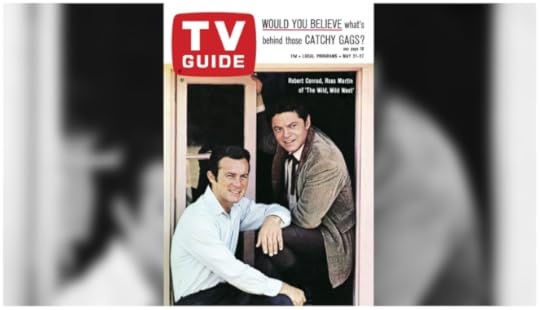
 This week's cover features the stars of CBS's" hit steampunk Western-cum-James Bond adventure series The Wild Wild West, Robert Conrad and Ross Martin. Although Conrad is the focal point of the CBS series (he is, after all, the one named West), it is Martin's performance as Artemus Gordon, master of disguise, that remains in the memory years later; Conrad himself freely admitted that Martin brought a warmth and style to his character that complimented and softened Conrad's brash and typically heroic James West, in much the same way that David McCallum did with Robert Vaughn on The Man from U.N.C.L.E. And, much as was the case with McCallum's Illya Kuryakin, Artemus Gordon has built up a fan base of his own, culminating in Leslie Raddatz's profile of "The wild, wild man from The Wild, Wild West."
This week's cover features the stars of CBS's" hit steampunk Western-cum-James Bond adventure series The Wild Wild West, Robert Conrad and Ross Martin. Although Conrad is the focal point of the CBS series (he is, after all, the one named West), it is Martin's performance as Artemus Gordon, master of disguise, that remains in the memory years later; Conrad himself freely admitted that Martin brought a warmth and style to his character that complimented and softened Conrad's brash and typically heroic James West, in much the same way that David McCallum did with Robert Vaughn on The Man from U.N.C.L.E. And, much as was the case with McCallum's Illya Kuryakin, Artemus Gordon has built up a fan base of his own, culminating in Leslie Raddatz's profile of "The wild, wild man from The Wild, Wild West." Martin, an exceptionally talented actor, has resigned himself to the fact that he'll never be the star, the heroic romantic lead; he was a psychopathic killer in the movie Experiment in Terror with Glenn Ford and Lee Remick, John Vivyan's sidekick Andamo in Mr. Lucky, and one of the regular panelists on Stump the Stars. "I can't say I'm happy being a second banana," he tells Raddatz, although he concedes that the role of Gordon, in which he eventually plays over 100 different characters, is "a show-off's showcase!" So far, he's had the chance to portray "a myopic Viennese geologist, a desert-rat prospector, a hammy Shakespearean actor, a derelict Civil War veteran, an old Swedish railroad worker, a Chinese coolie, a Parisian art connoisseur and President Grant himself." A show-off's showcase, indeed.
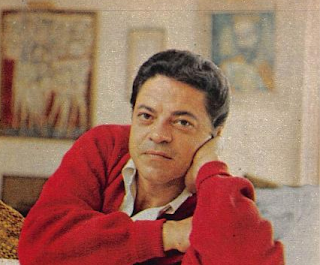 The road West hasn't always been a smooth or straight one; as Martin Rosenblatt, a new graduate from the City College of New York in 1940, he took the stage name Mickey Ross and started out in a vaudeville act with a classmate named, ironically, Bernie West. The act focused on topical comedy, and gave him the chance to impersonate contemporary figures such as FDR, Hitler, Ronald Coleman, and even the rooster that figures in the opening credits for the RKO-Pathé newsreel. After settling down and starting a family, the itch to return to acting—the job he wanted all along—became impossible to ignore. He was hired as an actor and announcer at WTOP radio in Washington D.C., where he also served to introduce Arthur Godfrey's daily show. "The first day, after Ross had intoned the introduction in what he considered the proper announcorial tone, Godfrey came on saying, 'Ross Martin —well, la-de-da!' The next morning, Ross made the announcement in an exact take-off of Godfrey’s voice. There was a moment of silence, after which The Great Man merely said, 'Good morning,' which is the way it was from then on."
The road West hasn't always been a smooth or straight one; as Martin Rosenblatt, a new graduate from the City College of New York in 1940, he took the stage name Mickey Ross and started out in a vaudeville act with a classmate named, ironically, Bernie West. The act focused on topical comedy, and gave him the chance to impersonate contemporary figures such as FDR, Hitler, Ronald Coleman, and even the rooster that figures in the opening credits for the RKO-Pathé newsreel. After settling down and starting a family, the itch to return to acting—the job he wanted all along—became impossible to ignore. He was hired as an actor and announcer at WTOP radio in Washington D.C., where he also served to introduce Arthur Godfrey's daily show. "The first day, after Ross had intoned the introduction in what he considered the proper announcorial tone, Godfrey came on saying, 'Ross Martin —well, la-de-da!' The next morning, Ross made the announcement in an exact take-off of Godfrey’s voice. There was a moment of silence, after which The Great Man merely said, 'Good morning,' which is the way it was from then on."His big break came when he landed a small part in Peter Gunn, a prototype of the Andamo role he was to take on in Mr. Lucky. Both shows were directed by Blake Edwards, who remembered him, and when Edwards called him six months after Gunn and offered him the job in Mr. Lucky, Martin thought it a joke at first. From there on, the TV and movie roles followed. Although Martin describes himself as "a warm, somewhat talky, even-dispositioned, multi-interested, bright dilettante," he is in fact respected and well-liked by his contemporaries. He has a friendly but somewhat guarded relationship with Conrad, as he did with Vivyan on Mr. Lucky; in fact, most of his friends are from outside of show business.
Although The Wild Wild West was Martin's best-known role, he remained working in television; in addition to returning as Artemus in two Wild Wild West made for TV movies, he played a recurring villain in Hawaii Five-O, did a wonderful turn as a murderer in Columbo, and even portrayed Charlie Chan in a pilot for a possible series. Oh, by the way, he was also a concert-trained violinist, a talent he was able to employ in an episode of West. He died from a heart attack in 1981 at the much-too-early age of 61, but he left a body of work that continues to entertain today.
l l l
 During the 60s, the Ed Sullivan Show and The Hollywood Palace were the premiere variety shows on television. Whenever they appear in TV Guide together, we'll match them up and see who has the best lineup..
During the 60s, the Ed Sullivan Show and The Hollywood Palace were the premiere variety shows on television. Whenever they appear in TV Guide together, we'll match them up and see who has the best lineup..Sullivan: Scheduled guests: singers Maria Cole and Nancy Sinatra; Metropolitan Opera baritone Robert Merrill; the comedy teams of Allen and Rossi, and Stiller and Meara; Elva Miller, a housewife-turned-singer; and the West Point Glee Club.
Palace: Host Bing Crosby introduces comedian Shelly Berman; singer Leslie Uggams; lyricist Johnny Mercer; the singing King Family; the Three Mecners, Polish acrobats; Mac Ronay, French comic magician; and British vaudevillians Pat Daly and Bill Wayne.
Little-known fact of the week: when the King Family first appeared on The Hollywood Palace, almost two years to the date from this issue, the outpouring of public approval (reportedly 53,000 letters) resulted in them getting their own series. That series has since come and gone, but this week the Kings are back on the Palace. As for the rest of the matchup, on the one hand you have the great Robert Merrill, the occasionally funny Stiller and Meara, the funny-then-but-not-so-much-now Allen and Rossi, and Nancy Sinatra; on the other you have Bing Crosby, Shelly Berman, Leslie Uggams, and Johnny Mercer. Almost a push, but not quite, so we'll Ac-Cent-Tchu-Ate the Positive and give the nod to the Palace. (Besides, the Kings outnumber the rest of us.)
l l l
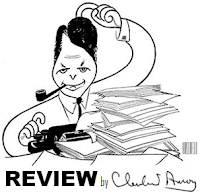 Throughout the 60s and early 70s, TV Guide's weekly reviews were written by the witty and acerbic Cleveland Amory. Whenever we get the chance, we'll look at Cleve's latest take on the shows of the era.
Throughout the 60s and early 70s, TV Guide's weekly reviews were written by the witty and acerbic Cleveland Amory. Whenever we get the chance, we'll look at Cleve's latest take on the shows of the era. Peter Graves had a considerable body of work to his name prior to Mission: Impossible, including a raft of B-movies that wound up on Mystery Science Theater 3000. As far as television is concerned, though, I'm guessing he was probably best known for Fury. It's interesting, therefore, to get Cleveland Amory's take on one of his lesser-remembered series, the military drama Court-Martial, which co-stars Bradford Dillman.
Court-Martial is part of the British invasion of American television, produced by Lew Grade's ITC (responsible for British imports ranging from Thunderbirds to The Avengers, The Prisoner, and The Saint), but the focus is on Graves and Dillman, who play Judge Advocate Generals for the United States Army during World War II. It probably has one of the longest gestation periods of any television series, based on a 1963 episode of Kraft Suspense Theatre that also starred Graves and Dillman; however, it was worth the wait. Despite its title, relatively little of the series actually takes place in court; most of the plots focus on the preparation of the case for the defense, with Graves and Dillman rotating leads each week. Unlike the criminal justice system, military justice can be somewhat unforgiving, and the mitigating circumstances that might get you a reduced sentence in a regular court don't count for much here. Frequently, "there’s only one ending possible, an unhappy one." Fortunately, adds Cleve, this is a British production, and "the British have the guts to make those endings possible on your screen."
In addition to the challenging storylines, the series features exciting storylines and excellent performances, from guest stars and leads alike. According to Amory, "Graves, brother of James Arness, is more believable in his role than is Dillman, husband of Suzy Parker." Have no fear, though, for regardless of who plays the lead, "this is the kind of show where even the bad guys are such good actors you feel sorry for them." There used to be some episodes floating around on YouTube and the Internet Archive, although most of them seem to have disappeared; on the other hand, if you're dipping into the grey market, you'll be able to track them down. You just might find it worth your while.
l l l
Saturday begins with some major sporting events, starting at 2:00 p.m. PT as Cassius Clay defends his world heavyweight championship against England's Henry Cooper on ABC's Wide World of Sports, live via Early Bird satellite from Arsenal Stadium in London. Cooper is thought to have a real chance in this fight; he'd knocked Clay down in their previous bout in 1963 before Clay rallied to win. Cooper is a bleeder who cuts easily, though, and after Clay opens up a cut above Cooper's left eye in the sixth round (which would later require 12 stitches to close), the referee stops the bout, with Clay retaining his title.
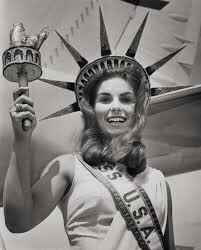 Stateside, it's the Preakness Stakes, second jewel of the Triple Crown, with CBS's half-hour coverage beginning at 2:30 p.m. Kauai King, the Kentucky Derby winner, takes the prize here as well, but his Triple Crown hopes will be dashed three weeks hence with a fourth place finish in the Belmont. And, if you're up for it, there's yet another championship boxing match, with José Torres successfully defending his light-heavyweight championship against Wayne Thornton, live from Shea Stadium in New York City (7:30 p.m., KTVU in San Francisco). For the less violent, try the ◀ Miss U.S.A. Beauty Pageant (10:00 p.m., CBS), live-on-tape from the sun-and-fun capital of America, Miami Beach, with June Lockhart, Jack Linkletter, and Pat Boone placing the crown on Hungarian refugee Maria Remenyi, Miss California.
Stateside, it's the Preakness Stakes, second jewel of the Triple Crown, with CBS's half-hour coverage beginning at 2:30 p.m. Kauai King, the Kentucky Derby winner, takes the prize here as well, but his Triple Crown hopes will be dashed three weeks hence with a fourth place finish in the Belmont. And, if you're up for it, there's yet another championship boxing match, with José Torres successfully defending his light-heavyweight championship against Wayne Thornton, live from Shea Stadium in New York City (7:30 p.m., KTVU in San Francisco). For the less violent, try the ◀ Miss U.S.A. Beauty Pageant (10:00 p.m., CBS), live-on-tape from the sun-and-fun capital of America, Miami Beach, with June Lockhart, Jack Linkletter, and Pat Boone placing the crown on Hungarian refugee Maria Remenyi, Miss California. Sunday night, it's the final first-run episode of Perry Mason, "The Case of the Final Fade-Out" (9:00 p.m., CBS), with (spoiler alert!) Dick Clark as the killer! I love how this episode ends; after everything's wrapped up, Perry, Della, and Paul begin looking over the files of another case. The implication: though the series may be over, Perry's work never ends. A perfect lead-in to an eternity of reruns and TV-movies.
That's followed at 10:00 p.m. by the 18th annual Emmy Awards (CBS), hosted by Danny Kaye in Hollywood and Bill Cosby in New York. The night's big winner is The Dick Van Dyke Show, which takes home four awards, including best comedy series, best actor (Dick Van Dyke), and best actress (Mary Tyler Moore). The other major winners include The Fugitive for best drama, The Andy Williams Show for best variety series, and Frank Sinatra: A Man and His Music as best musical program. The broadcast clocks in at a cool 90 minutes; those were the days.
Monday marks the start of the week, and the start of celebrities' week-long stints on various daytime game shows. It's a pretty good lineup on hand: Peter Lawford and Lee Remick on Password (1:00 p.m., CBS), John Astin and Ruta Lee on You Don't Say! (2;00 p.m., NBC), and Carol Lawrence and Mitch Miller on The Match Game (2:30 p.m., NBC)
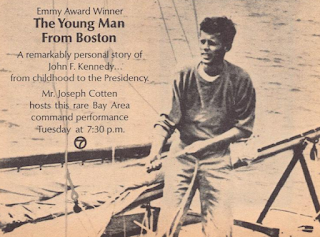 This week marks the 49th birthday of the late John F. Kennedy, commemorated with two specials during the week. On Tuesday, Joseph Cotton narrates "Young Man from Boston" (7:30 p.m., KGO in San Francisco), which follows JFK in his early years, including his days at Harvard, his life as son to Ambassador Joseph Kennedy, his naval career, and the beginning of his life in politics; Gordon MacRae, the Mormon Tabernacle Choir, and the Kingston Trio provide the music. On Wednesday, Cliff Robertson (who starred as Kennedy in the movie PT 109) narrates "John Fitzgerald Kennedy" (9:00 p.m., KTVU in San Francisco), which picks up with Kennedy as a freshman senator, his election as president, and major events including the Bay of Pigs, the Cuban Missile Crisis, and the Berlin Wall. Jim Bishop, author of A Day in the Life of President Kennedy (and future author of The Day Kennedy Was Shot) describes JFK's family life—the sanitized version, one would imagine. Also on Tuesday, CBS presents the second
National Drivers Test
(10:00 p.m.), and there's a handy answer form in TV Guide for those of you competing at home. Walter Cronkite and Mike Wallace are the hosts.
This week marks the 49th birthday of the late John F. Kennedy, commemorated with two specials during the week. On Tuesday, Joseph Cotton narrates "Young Man from Boston" (7:30 p.m., KGO in San Francisco), which follows JFK in his early years, including his days at Harvard, his life as son to Ambassador Joseph Kennedy, his naval career, and the beginning of his life in politics; Gordon MacRae, the Mormon Tabernacle Choir, and the Kingston Trio provide the music. On Wednesday, Cliff Robertson (who starred as Kennedy in the movie PT 109) narrates "John Fitzgerald Kennedy" (9:00 p.m., KTVU in San Francisco), which picks up with Kennedy as a freshman senator, his election as president, and major events including the Bay of Pigs, the Cuban Missile Crisis, and the Berlin Wall. Jim Bishop, author of A Day in the Life of President Kennedy (and future author of The Day Kennedy Was Shot) describes JFK's family life—the sanitized version, one would imagine. Also on Tuesday, CBS presents the second
National Drivers Test
(10:00 p.m.), and there's a handy answer form in TV Guide for those of you competing at home. Walter Cronkite and Mike Wallace are the hosts.Opinions have always been split on Gilligan's Island: some thing it's nothing more than a silly sitcom, while others see it as a shrewd satire on the human condition. Thursday's episode (8:00 p.m., CBS) as a little something for everyone, I think: "Scientists believe they've discovered life on Mars, unaware that their space probe veered off course—and that the rocket's TV camera was focused on the castaways' hut. An absurd idea, unless you want to view it as a poke at the gullibility of scientists—which, considering the last few years, may be exactly the way to watch it.
More and more, it seems as if the humor in politics is unintentional, or at least ironic, but there was a time when one could find plenty to laugh about in satirizing our elected officials, and we can see it in A Funny Thing Happened on the Way to the White House (Friday, 7:00 p.m., in a rebroadcast of a network program from last week, KRCR in Redding). Jack Paar is the host and narrator, which his guests Elliott Reid, Tom Lehrer, the Plaza 9 Players, and the Buster Davis Singers. We could use some laughs like this today, couldn't we?.
l l l
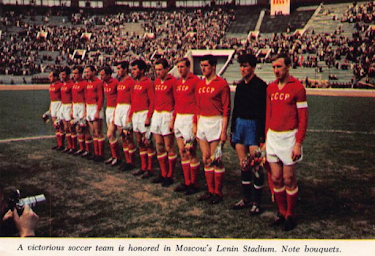 Speaking of sports, as we were, there's another article of interest in this issue, notable as much for what it doesn't say as for what it does. It's Neil Hickey's "Is There An Athletic Gap?", a look at Sunday night's NBC documentary The Russian Sports Revolution. The question on everyone's mind is why the Soviets have become such a athletic superpower. The reasons given are the standard ones: special training for promising athletes identified at a young age to be groomed for success, governed and subsidized by a government organization called the All-Union Committee for Physical Culture and Sport. "It's a sports-crazy country," sportscaster Jim Simpson says, and international success by Soviet teams and individuals has become a prime weapon in the ongoing Cold War.
Speaking of sports, as we were, there's another article of interest in this issue, notable as much for what it doesn't say as for what it does. It's Neil Hickey's "Is There An Athletic Gap?", a look at Sunday night's NBC documentary The Russian Sports Revolution. The question on everyone's mind is why the Soviets have become such a athletic superpower. The reasons given are the standard ones: special training for promising athletes identified at a young age to be groomed for success, governed and subsidized by a government organization called the All-Union Committee for Physical Culture and Sport. "It's a sports-crazy country," sportscaster Jim Simpson says, and international success by Soviet teams and individuals has become a prime weapon in the ongoing Cold War.Accepting the idea that the Soviet system has its advantages, how can the Americans hope to compete? The ongoing rivalry between the Amateur Athletic Union (AAU) and the NCAA is blamed for much of the nation's problems. "We have such a hit-and-miss, shoddy athletic system here it's unbelievable," Simpson says. A special Senate committee investigation produces such a gloomy prognosis that Vice President Humphrey appoints a special arbitration committee in hopes of resolving the intra-organizational dispute.
Doubtless all of this was true, but we now know much more, including the preponderance of performance-enhancing drugs that were used by Eastern bloc countries, especially East Germany. Hormones, steroids, blood doping, and the like were thought responsible for as many as 10,000 athletes, many of whom had no idea they were being turned into addicts by their trainers and coaches.
There had always been rumors about what the Eastern Europeans were doing; I wonder if any of them made their way into NBC's broadcast?
l l l
Scattered notes from the Teletype: Batman, after just one week, has hit the top 10 in Japan. Johnny Carson begins a five-week vacation in July; Joey Bishop will guest host. And Martin Landau has a recurring guest-star role in the new Mission: Impossible, playing a makeup artist who's a master of disguise.*
*Possibly a descendant of Artemus Gordon?
The thing is, if you watch the first season of M:I, you'll notice that Landau is in every episode, albeit listed as "Special Appearance by"—but how special can it be if he's there every week? In fact, one of the reasons for Landau's expanded presence on the series was that star Steven Hill, an Orthodox Jew, refused to work after 4pm Friday until after sundown Saturday, and Landau's character, who in fact was only supposed to appear as one of several rotating guest stars, took up much of the slack. (Indeed, in several episodes Landau's assignment has little to do with disguise.) Landau himself refused to sign the typical contract in order to maintain availability for feature film work, and didn't become an actual "regular" until the second season, by which time Hill had been replaced by none other than Court-Martial's Peter Graves; at least now we know what he was doing before he joined the Impossible Missions Force.
l l l
 Last week, we spent some time looking at the quality of television programming in 1964, and there were a lot of people who felt it wasn't quite up-to-par. This week, Henry Harding looks at it from another perspective, based on a study conducted by the Politz Media Service in the fall of 1965, for which they surveyed 4,020 viewers on their television preferences. Nothing particularly unusual about that; Nielsen's been doing it for quite a while. What Politz did, however, was break down the results by various demographic characteristics*, and the results produced a number of surprises.
Last week, we spent some time looking at the quality of television programming in 1964, and there were a lot of people who felt it wasn't quite up-to-par. This week, Henry Harding looks at it from another perspective, based on a study conducted by the Politz Media Service in the fall of 1965, for which they surveyed 4,020 viewers on their television preferences. Nothing particularly unusual about that; Nielsen's been doing it for quite a while. What Politz did, however, was break down the results by various demographic characteristics*, and the results produced a number of surprises.*I'm assuming, based on the amount of ink used on this article, that such extensive demographic profiling was fairly uncommon for the time.
For one thing, it appears that education level is not a defining characteristic when it comes to the most popular television programs. Shows that might ordinarily be thought of as "low-brow"—Red Skelton, Gomer Pyle, Lawrence Welk, Ed Sullivan and The Beverly Hillbillies were among the shows cited— were among the most popular programs for college graduates.
In search of an explanation for these seemingly counter-intuitive results, Herbert Kay Research, Inc. came up with some "tentative" conclusions, including: "People of high intelligence tend to like the same programs that people of lower intelligence like." That sounds obvious considering the findings of the Politz poll, but it's interesting nonetheless; we've long heard about how television viewers don't really want intelligent programming. Is this evidence of that, or do intelligent people watch "non-intelligent" shows because that's all that's on?
Ah, you might say, but intelligent shows don't get high ratings because there aren't enough smart people to watch them. Everyone knows smart people have better things to do with their time than watch the boob tube! But you'd be wrong; again, according to Kay Research, "proportionately more people of high intelligence than low were found among those who habitually watch a great deal of television."
I suppose you could argue that TV had already succeeded in dumbing down even the smartest audience. But it's probably a question we'll never be able to answer.
l l l
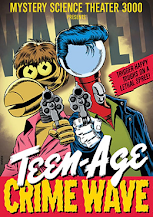 MST3K alert: Teen-Age Crime Wave (1955). Three dangerous juvenile delinquents take refuge in the home of a farmer and his family. Tommy Cook, Mollie McCart, Sue England. (Saturday, 1:45 a.m. as part of KGO's All-Night Movies ) Let's see, so far we've had Teen-Age Caveman, Teen-Age Strangler, and Teenagers From Outer Space, so I suppose this would be the natural succession. Our three stars are the three teens holding the family hostage, but of course one of them has to be the weak link, allowing the plot to fail. Well, what did you expect—In Cold Blood? And if those actors are teenagers, then I'm Truman Capote. TV
MST3K alert: Teen-Age Crime Wave (1955). Three dangerous juvenile delinquents take refuge in the home of a farmer and his family. Tommy Cook, Mollie McCart, Sue England. (Saturday, 1:45 a.m. as part of KGO's All-Night Movies ) Let's see, so far we've had Teen-Age Caveman, Teen-Age Strangler, and Teenagers From Outer Space, so I suppose this would be the natural succession. Our three stars are the three teens holding the family hostage, but of course one of them has to be the weak link, allowing the plot to fail. Well, what did you expect—In Cold Blood? And if those actors are teenagers, then I'm Truman Capote. TV
Published on May 18, 2024 05:00
May 17, 2024
Around the dial
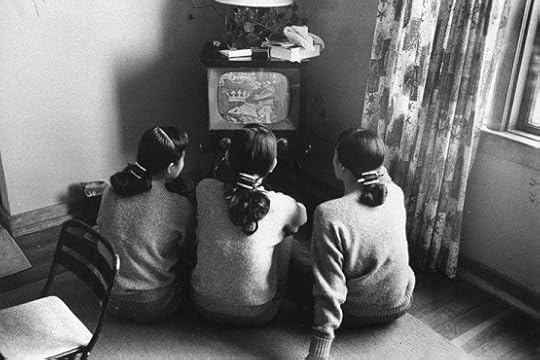
 At bare-bones e-zine, Jack's Hitchcock Project turns to "
The Cheyney Vase
," an episode from the series' first season, written by Robert Blees, and starring Darren McGavin as a would-be thief who gets quite a surprise.
At bare-bones e-zine, Jack's Hitchcock Project turns to "
The Cheyney Vase
," an episode from the series' first season, written by Robert Blees, and starring Darren McGavin as a would-be thief who gets quite a surprise.By contrast, at The Twilight Zone Vortex, Jordan looks at the classic "Living Doll," from the series' fifth and final season, a Charles Beaumont story ghostwritten by Jerry Sohl, due to Beaumont's increasing dementia. It stars Telly Savalas and a very nasty talking doll.
At Cult TV Blog, John shares his thoughts on a pair of thoughtful, dystopic stories : The Guardians, a 1971 series presenting a totalitarian government in Britain, which looks quite interesting; and the very black 1969 comedy The Bed Sitting Room, featuring Dudley Moore and Rita Tushingham.
Despite my love for classic Doctor Who, I've had no interest in watching the last few seasons of the reboot, and no intention of doing so in the future. Nonetheless, it would be a mistake to point out that a new season has begun with a new Doctor, and The View from the Junkyard has all the details.
Worth mentioning as well is news of a more positive (in my opinion) nature: Television Obscurities shares word that Warner Archives is releasing (in Blu-ray!) the 1959-60 series The Alaskans , starring Roger Moore, Jeff York, and Dorothy Provine. It's already on my want list.
Remember the Campbell's Soup Kids? They were a hallmark of Campbell's advertising, which had a significant presence on both radio and television. Travalanche looks at some of Campbell's offerings through the years , including a couple of vintage print ads featuring the Kids.
Finally, no fan of MST3K could overlook the news of Roger Corman's death last week, aged 98. At S Shroud of Thoughts, Terence has an appreciation for Corman's body of work , as well as his filmmaking legacy, which is just as considerable. R.I.P. TV
Published on May 17, 2024 05:00
May 15, 2024
If I ran the network, part 2

Last month, I kicked off a new feature, "If I Ran the Network," a series of TV concepts that would never have made it to the small screen without network executives screwing them up. You can see the first entry here. If you have similar ideas, please share them in the comments section; if I get enough, I'll use them to put together a complete prime-time lineup!
 I've mentioned this idea before, although not under the name: Scales of Justice.* It's not an original concept as much as it is a refinement on an existing one, but it appeals to my core belief that good television ought to stimulate conversation, to give you insights you might not have had before, to make you think about what you saw and speculate about what might have happened after the episode ended.
I've mentioned this idea before, although not under the name: Scales of Justice.* It's not an original concept as much as it is a refinement on an existing one, but it appeals to my core belief that good television ought to stimulate conversation, to give you insights you might not have had before, to make you think about what you saw and speculate about what might have happened after the episode ended.*Since this series is based on the premise that you couldn't get it past meddling network executives, it's worth mentioning that the first thing a VP of Programming would do is insist that the protagonist be a Justice Department maverick named Jack Scales. The title sequence each week would include him introducing himself as Scales of Justice. Get it?
Scales of Justice most closely follows Law and Order, in that each episode consists of two parts: the crime and subsequent investigation, and the trial. It's a whodunnit, in the sense that we don't actually see the crime committed; instead, we experience the aftereffects of said crime. In other words, we do not know for sure that the person arrested and put on trial is, in fact, the guilty party.
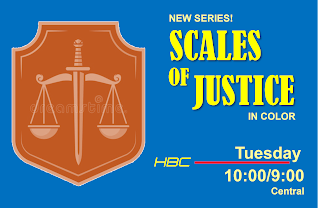 So far, so good. (I hope.) But where Law and Order suggests that the authority figures (the police and the lawyers in the DA's office) are the protagonists, there is no such guarantee in Scales of Justice. Think of it more as a version of The Wire, or a similar gritty police show, where the authorities are, in the best of circumstances, antiheroes. Sometimes, it will turn out that the police arrested the wrong person. Sometimes, during the course of the investigation, the detectives will make a fatal error, either by questioning the suspect without legal counsel or by discovering evidence without following the proper constitutional procedure, which winds up with the judge throwing the evidence out. Sometimes it will simply be a case where the police focus on one suspect early on, to the exclusion of others, and stop looking for evidence that might be inconvenient to their case. (A favorite accusation that Perry Mason makes against Burger, Tragg, et. al.) You'll like some of these characters more often than you do others, but you'll neither like nor dislike any of them all of the time.
So far, so good. (I hope.) But where Law and Order suggests that the authority figures (the police and the lawyers in the DA's office) are the protagonists, there is no such guarantee in Scales of Justice. Think of it more as a version of The Wire, or a similar gritty police show, where the authorities are, in the best of circumstances, antiheroes. Sometimes, it will turn out that the police arrested the wrong person. Sometimes, during the course of the investigation, the detectives will make a fatal error, either by questioning the suspect without legal counsel or by discovering evidence without following the proper constitutional procedure, which winds up with the judge throwing the evidence out. Sometimes it will simply be a case where the police focus on one suspect early on, to the exclusion of others, and stop looking for evidence that might be inconvenient to their case. (A favorite accusation that Perry Mason makes against Burger, Tragg, et. al.) You'll like some of these characters more often than you do others, but you'll neither like nor dislike any of them all of the time.Speaking of Perry Mason, another element I wanted to introduce in Scales of Justice is a defense attorney who becomes a semi-regular, appearing a few times each season (depending on how many episodes we have). For this character, think of someone like Gerry Spence—an attorney who has never lost a criminal case. One of the aspects of Perry Mason that I never thought held water was the idea that Burger was always complaining about Mason's "courtroom theatrics," even though those theatrics had helped clear his client and identify the real killer every single week. You'd think that Burger, having lost to Mason every time they go head-to-head, would start to worry about his case one he found out Perry would be defending the accused. I suspect he'd demand that the homicide detectives double-, triple-, and even quadruple-check everything before he even sought an indictment. (Of course, that's the way it should be anyway, but we'll let it pass for the time being.)
And that's the reason why I wanted to introduce this Mason-like defense attorney. By the time he appears in the first-season finale, the audience is conditioned to know that his client, the accused, is innocent. My intent was that viewers would then start thinking about what they'd seen in the first half of the episode; since we know the accused didn't do it, that means that somewhere along the line, either the police or the DA's office took the wrong fork in the road. What was it? Where did they go wrong? And not only did I want viewers to start thinking this way, I wanted those in charge to have those same thoughts. We must have made a mistake. Where did we go wrong? I've written plenty about how much I dislike many of today's procedurals; what I wanted to accomplish with Scales of Justice, more than anything else, was to knock the ego-driven, cocksure investigators—think Stabler or Gibbs or whatever your favorite procedural might be—off their perch.
I also wanted these mistakes to have consequences; perhaps one of the detectives is suspended for a few episodes because he's violated the accused's constitutional rights one time too many. Maybe one of the assistant DAs gets sacked because of poor case preparation. But that's not to say that they won't get their rewards for doing a good job; we might see a detective get a promotion, or one of the DAs start appearing more often. At any rate, it's a great threat to hold over the head of cast members: you can be replaced at any time!
Some of you will see the obvious parallels to the 1963 drama Arrest and Trial, in which Ben Gazzara played the college-educated detective who makes the arrest, while Chuck Connors is the defense attorney who tries to get the accused acquitted. We're watching the show right now, and it's pretty good, with fine performances and some very thought-provoking situations. The problem with the concept, however, was that by definition it meant that each week, one of the two protagonists would be proved wrong.
The producers, I thought, tried some clever ideas to get around this; for instance, Gazzara, being college-educated, is far more inclined than most detectives of the time to consider the environment from which the perp came, as well as other mitigating circumstances. Sometimes, although the evidence forces him to make the arrest, he simply doesn't believe that the suspect is guilty—he has to follow the evidence (as you would on CSI), but his gut tells him that there's more to the story than what the evidence says.
Likewise, Connors sometimes finds out that his client is actually guilty, and manages to convince them to change their plea. More often, though, we'll see that his ultimate goal is to take advantage of those mitigating circumstances to save his client from a harsher punishment—life in prison, for example, rather than the death penalty. He's constantly working the jury (it's a pleasure to watch him do so), trying to get them to understand that, even though his client may have killed someone, he's not a "murderer." Sometimes it works, sometimes it doesn't.
Despite this, it doesn't quite work, and this is something I wanted to avoid with Scales of Justice. That's why it's important that viewers didn't always like the usual "good guys," or why getting someone off on a technicality might actually be a good thing (if you're ever accused of a crime, you can bet you'd want an attorney committed to giving you the best defense possible). That can be a hard sell, although I think it's more plausible now that antiheroes are more acceptable on television. (Same with The Killer; I wonder if this says something about me?) But if you're worried that audiences want to identify with a protagonist each week, then make it an anthology. I know, I know, anthologies don't work anymore, unless you're doing a six- or eight-episode season, after which you introduce a new cast. But this way each week would truly leave you wondering which way the case would go. I don't like that idea as well as the original, but at least it shows that I'm willing to deal in good faith.
At any rate, it would never be very likely that a series like Scales of Justice would find a place on a fall schedule. As I said, people want to root for the regulars every week. They wouldn't like seeing their favorites from Dick Wolf's stable of shows get spanked for screwing up, or just being a bad human being. Most of all, I don't think they'd like the ambiguity of the whole concept, the idea that policemen can make mistakes (even though they can), that innocent people get put on trial (even though they do), that sometimes we might not even know if the jury came in with the right verdict (even though we can't always be positive). Hence, the title Scales of Justice: sometimes the blindfolded lady's scales tip one way, sometimes the other. In other words, it would look too much like real life to have a chance on television.
I could be wrong, though. People have always liked series featuring defense attorneys: think Perry Mason or Matlock. And we know people like police procedurals. Suppose we combined the two, like peanut butter and chocolate? It could work. Couldn't it? TV
Published on May 15, 2024 05:00
May 13, 2024
What's on TV? Saturday, May 9, 1964

 We may be going back 60 years here, but it's impressive how many of these programs we can still watch today. It's a feast for classic TV fans, really: Tennessee Tuxedo, Supercar, The Alvin Show, Sky King, Rin Tin Tin, Quick Draw McGraw, The Defenders, Gunsmoke, Riverboat, Tightrope!, Fireball XL-5, Dennis the Menace, Fury, Bullwinkle, Soldiers of Fortune, The Lieutenant, The Joey Bishop Show, Wire Service, 26 Men, Ripcord, Mr. Lucky, Naked City, Sea Hunt, Range Rider, Captain Gallant—these series have all had at least some of their episodes, if not the complete series, released on DVD or available on YouTube. You can go through this entire issue and find more examples—Combat!, The Fugitive, Route 66, Burke's Law—but as far as this Saturday from the Minneapolis-St. Paul edition, you could (with the exception of sports and local programs) replicate a great deal of what was on, including the movies. Remarkably well-documented, don't you think?
We may be going back 60 years here, but it's impressive how many of these programs we can still watch today. It's a feast for classic TV fans, really: Tennessee Tuxedo, Supercar, The Alvin Show, Sky King, Rin Tin Tin, Quick Draw McGraw, The Defenders, Gunsmoke, Riverboat, Tightrope!, Fireball XL-5, Dennis the Menace, Fury, Bullwinkle, Soldiers of Fortune, The Lieutenant, The Joey Bishop Show, Wire Service, 26 Men, Ripcord, Mr. Lucky, Naked City, Sea Hunt, Range Rider, Captain Gallant—these series have all had at least some of their episodes, if not the complete series, released on DVD or available on YouTube. You can go through this entire issue and find more examples—Combat!, The Fugitive, Route 66, Burke's Law—but as far as this Saturday from the Minneapolis-St. Paul edition, you could (with the exception of sports and local programs) replicate a great deal of what was on, including the movies. Remarkably well-documented, don't you think?-4- WCCO (CBS) Morning 6:30 SUNRISE SEMESTER—Education 7:00 CAPTAIN KANGAROO—Children 8:00 ALVIN—Cartoons 8:30 TENNESSEE TUXEDO 9:00 QUICK DRAW McGRAW 9:30 MIGHTY MOUSE—Cartoons 10:00 RIN TIN TIN—Western 10:30 ROY ROGERS—Western 11:00 SKY KING—Adventure 11:30 SUPERCAR—Children Afternoon 12:00 NEWS—Don Dahl 12:15 WEATHER—Bob Potter 12:20 SPORTS—Hal Scott 12:30 TOP STAR BOWLING 1:30 SATURDAY SPORTS SPECIAL University of Minnesota intrasquad football game 3:00 RIVERBOAT—Adventure 4:00 CALL YOUR SHOT—Billiards 4:30 DIVORCE COURT—Drama 5:30 BATTLE LINE—Documentary Evening 6:00 NEWS—Dave Moore 6:15 SPORTS—Don Dahl 6:25 WEATHER—Don O’Brien 6:30 JACKIE GLEASON—Comedy 7:30 DEFENDERS—Drama 8:30 PHIL SILVERS—Comedy 9:00 GUNSMOKE—Western 10:00 NEWS—Dave Moore 10:15 WEATHER—Bud Kraehling 10:20 SPORTS—Don Dahl 10:30 MOVIE—Mystery Critics Award: “Twenty Plus Two” (1962) 12:00 NEWS—Dave Moore 12:15 RIVERBOAT—Adventure 1:15 NIGHT KAPPERS—Carlson
-5- KSTP (NBC) Morning 7:30 MINNESOTA FARM SCENE 8:00 ANDY’S GANG—Children 8:30 RUFF AND REDDY COLOR 9:00 HECTOR HEATHCOTE COLOR 9:30 FIREBALL XL-5—Children 10:00 DENNIS THE MENACE—Comedy 10:30 FURY—Adventure 11:00 BULLWINKLE COLOR 11:30 TELESPORTS DIGEST Afternoon 12:00 SOLDIERS OF FORTUNE 12:30 FAMOUS PLAYHOUSE—Drama “The Survey Man” 1:00 MOVIE—War Drama “A Yank in the RAF” (1941) 2:30 MOVIE—Drama “Boomerang” (1947) 4:00 MR. WIZARD—Science 4:30 NBC SPORTS SPECIAL AAU Judo Championships 5:00 CALVIN GRIFFITH COLOR 5:15 NEWS—Sander Vanocur 5:30 LOVE THAT BOB!—Comedy Evening 6:00 NEWS—Bob Ryan COLOR 6:15 WEATHER—Johnny Morris COLOR 6:20 SPORTS—Al Tighe COLOR 6:30 LIEUTENANT—Drama 7:30 JOEY BISHOP—Comedy COLOR 8:00 MOVIE—Drama Saturday Night at the Movies: “Executive Suite” (1954) 10:00 NEWS—Bob Ryan COLOR 10:15 WEATHER—Johnny Morris COLOR 10:20 SPORTS—Al Tighe COLOR 10:30 MOVIE—Musical Comedy COLOR “Down Argentine Way” (1940) 12:15 MOVIE—Drama “Woman and the Hunter” (English; 1957)
-9- KMSP (ABC) Morning 9:00 GRANDPA KEN AND HIS PALS 9:30 ALLAKAZAM—Children 10:00 CASPER—Cartoons 10:30 BEANY AND CECIL—Cartoons 11:00 BUGS BUNNY—Cartoons 11:30 AMERICAN BANDSTAND—Clark Guests: Dusty Springfield, Round Robin Afternoon 12:30 WIRE SERVICE—Drama 1:30 26 MEN—Western 2:00 MR. LUCKY—Adventure 2:30 TIGHTROPE!—Police 3:00 WRESTLING CHAMPIONS 4:00 WIDE WORLD OF SPORTS Porterville Rodeo 5:30 ABC NEWS REPORTS Guest: Brazil president Gen. Castello Branco Evening 6:00 RIPCORD—Adventure COLOR 6:30 HOOTENANNY—Songs Guests: Josh White, the Chad Mitchell Trio, Carolyn Hester, the Modern Folk Quartet, the Serendipity Singers, Enid Mosier, Charlie Manna. Host: Jack Linkletter 7:30 LAWRENCE WELK—Music 8:30 HOLLYWOOD PALACE—Variety Host: Dale Robertson. Guests: Betty Hutton, Paul Lynde, Carole Cook, John Gary, Varel, Bailly and Les Chanteurs de Paris, Davis and Reese, Dave Parker, the Bumpy Spectaculars, Cuneo’s Horse Fantasy, the Womenfolk 9:30 NAKED CITY—Drama 10:30 MOVIE—Western “Lone Star” (1952)
11 WTCN (IND.) Morning 10:45 CARTOON CIRCUS 11:00 CHAMPIONSHIP BRIDGE—Goren 11:30 FUNNY COMPANY—Cartoons Afternoon 12:00 LUNCH WITH CASEY—Children 1:00 ROUNDHOUSE RODNEY 1:30 CAPTAIN GALLANT—Adventure 2:00 RANGE RIDER—Western 2:30 ROCKY AND HIS FRIENDS 3:00 COLONIAL INVITATIONAL—Golf SPECIAL Third round 4:00 MOVIE—Adventure “Fire Maidens Against the Son of Hercules” (Italian; 1963) 5:30 SEA HUNT—Adventure Evening 6:00 ALL STAR WRESTLING 7:30 MOVIE—Adventure “Tarzan’s Secret Treasure” (1941) 9:00 RANCH PARTY—Music 9:30 NEWS—Dick Ford 9:45 WEATHER—Stuart A. Lindman 9:50 SPORTS—Buetel, Horner 10:00 MOVIE—Drama “Sirocco” (1951) 12:00 SILENTS PEASE—Movies “The Ameriano” (1916)
TV
Published on May 13, 2024 05:00
May 11, 2024
This week in TV Guide: May 9, 1964
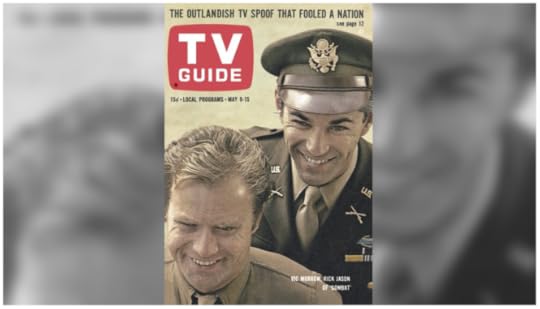
 This TV Guide came out the day after my fourth birthday, but that's not why I picked it up. No, I ran across this isolated copy in an antique store and, despite the fact it was somewhat battered and missing a page, I bought it to find out just what that outlandish TV spoof was that fooled a nation. After all, how can you pass up a teaser like that?
This TV Guide came out the day after my fourth birthday, but that's not why I picked it up. No, I ran across this isolated copy in an antique store and, despite the fact it was somewhat battered and missing a page, I bought it to find out just what that outlandish TV spoof was that fooled a nation. After all, how can you pass up a teaser like that?Somewhat to my surprise, it turns out the answer is the classic British series The Avengers. Perhaps it's our American sensibilities, the era in which the show first came to our shores, the episodes that were shown here, or the fact that I'm looking back on it with the perspective of many years, but I have a hard time believing that anyone could ever have taken The Avengers seriously as a spy thriller.
That doesn't mean I'm taking the series lightly or putting it down. If you're been a regular reader, you know The Avengers is a favorite of mine, particularly Patrick Macnee's dapper John Steed. (Of course, there's the beautiful Honor Blackman, the painfully young Diana Rigg, and the shapely Linda Thorson, but that is a topic—or two, or three—for another day. Or week.) But really. Considering the leather catsuits that Honor Blackman wore, could you really have thought this was straight drama? Apparently so, based on the frustration expressed by producer John Bryce, who after two seasons has finally admitted that "The Avengers was conceived as a satire of counterespionage thrillers, but the British public still insists on taking it seriously."
To be fair about it, the early episodes when Steed was partnered with Ian Hendry, John Rollason and Julie Stevens, were of quite a different tenor. The series was in black and white back then, and shot on tape rather than film, giving the shows a somewhat stagebound feeling. Cathy Gale, Blackman's character, was smart, independent, and tough—every bit the equal of her male counterparts. And the villains were typical spies, not fantastic, Doctor Who-type creations that came later, such as the Aquanauts and the Cybernauts. Seeing these episodes in isolation, one could understand how viewers might have seen The Avengers as pretty much of a straight drama, albeit with some lighthearted moments.
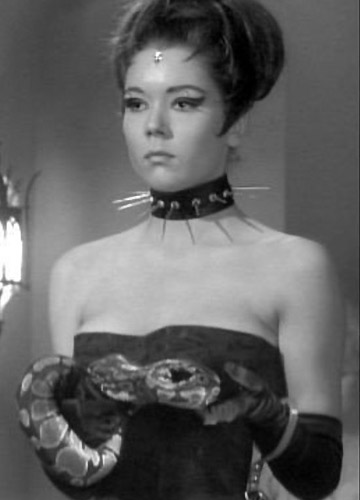 Mrs. Peel and one of her own leather outfitsThe straw that broke the camel's back, apparently, came a year or so into the run when critic Lionel Hale, appearing on a television panel show, expressed amazement that people didn't realize the show "was being played for laughs." The others on the panel protested—The Avengers didn't bill itself as satire, so how could this be the case? Such a British attitude, don't you think? After this little exchange, producer Bryce started looking back at past episodes, "moodily wonder[ing] what more he could do in the realm of wild unreality to get the idea over." After all, the show had already featured (1) a neo-Caesar, planning to conquer the world from the headquarters of his fertilizer factory, (2) Mrs. Gale running for Parliament while someone plants to detonate an H-bomb underneath the foundation, (3) Steed being brainwashed into thinking World War III has started, and (4) a pair of lawyers who sell perfect legal defenses to criminals before they commit crimes, with guaranteed acquittal promised. Bryce even contemplated "a program in which Mrs. Gale would be tied to the railroad tracks with the midnight express swiftly approaching. He said this was bound to give the game away."
Mrs. Peel and one of her own leather outfitsThe straw that broke the camel's back, apparently, came a year or so into the run when critic Lionel Hale, appearing on a television panel show, expressed amazement that people didn't realize the show "was being played for laughs." The others on the panel protested—The Avengers didn't bill itself as satire, so how could this be the case? Such a British attitude, don't you think? After this little exchange, producer Bryce started looking back at past episodes, "moodily wonder[ing] what more he could do in the realm of wild unreality to get the idea over." After all, the show had already featured (1) a neo-Caesar, planning to conquer the world from the headquarters of his fertilizer factory, (2) Mrs. Gale running for Parliament while someone plants to detonate an H-bomb underneath the foundation, (3) Steed being brainwashed into thinking World War III has started, and (4) a pair of lawyers who sell perfect legal defenses to criminals before they commit crimes, with guaranteed acquittal promised. Bryce even contemplated "a program in which Mrs. Gale would be tied to the railroad tracks with the midnight express swiftly approaching. He said this was bound to give the game away."By the time The Avengers made it over here, it fit in perfectly with shows like The Man From U.N.C.L.E., Batman, and other over-the-top adventure series; besides, American viewers never did get to see episodes with Mrs. Gale until they appeared on cable years later, and the earliest episodes would have been phantoms until the DVDs appeared. So perhaps we were already well prepared for the joke by that time. Still, I have to admit that the hook for this article turned out to be something of a letdown. I guess the joke was on me this time.
l l l
 During the 60s, the Ed Sullivan Show and The Hollywood Palace were the premiere variety shows on television. Whenever they appear in TV Guide together, we'll match them up and see who has the best lineup..
During the 60s, the Ed Sullivan Show and The Hollywood Palace were the premiere variety shows on television. Whenever they appear in TV Guide together, we'll match them up and see who has the best lineup..Sullivan: Scheduled guests include comediennes Phyllis Diller and Mary Tyler Moore; violinist Itzhac Perlman; vocalist Dusty Springfield; the Brooks Sisters, instrumental trio; comic Jackie Mason; the Cinco Latinos, vocal-instrumentalist quintet; and comic acrobat Doug Hart.
Palace: Host Dale Robertson introduces actress-songstress Betty Hutton; comics Paul Lynde and Carole Cook; vocalist John Gary; French singers Varel, Bailly and Les Chanteurs de Paris; comedians Davis and Reese; juggler Dave Parker; the Bumpy Spectaculars, acrobats; Cueno's Horse Fantasy; and the Womenfolk, a singing group.
It's true that when it comes to someone like Phyllis Diller, your mileage may vary. (It may also be true that there's a lot of mileage there in the first place.) The same can't be said for the delightful Mary Tyler Moore, though, and the great Itzhac Perlman is evidence of the middlebrow culture that Sullivan understood so well—while, at the same time, Dusty Springfield represents the new pop mentality that's on the way. And Jackie Mason's a Sullivan favorite, at least for a few more months . Over at the Palace, I like Dale Robertson; he's my kind of guy. But I never was a fan of Betty Hutton; always thought she was too much over the top. Paul Lynde is good, but he needs to be playing off of someone else. The rest of the show doesn't do a lot for me, which means that this week, I'm giving the nod this week to Sullivan.
l l l
 Throughout the 60s and early 70s, TV Guide's weekly reviews were written by the witty and acerbic Cleveland Amory. Whenever we get the chance, we'll look at Cleve's latest take on the shows of the era.
Throughout the 60s and early 70s, TV Guide's weekly reviews were written by the witty and acerbic Cleveland Amory. Whenever we get the chance, we'll look at Cleve's latest take on the shows of the era. Although television is a medium that could still be said to be in its infancy, it's not too early to talk about traditions being formed and followed. And, says Cleveland Amory, if there's any program on the air today that can lay claim to being part of a tradition, it's CBS Reports. An outgrowth of the legacy belonging to Fred Friendly and Edward R. Murrow, CBS Reports operates on two basic principles: "What we don't know can kill us," and "We are nobody's kept men—not even our own company's." One can see, especially from that last quote of Friendly's, how there would eventually be a break between Friendly and CBS, but that's a couple of years in the future.
The result, according to Cleve, is that CBS Reports has, "season after season, come up with the finest documentaries this side of a good book." He cites such landmark presentations as "The Silent Spring of Rachel Carson" and "Harvest of Shame" as a retort to those who don't think there's anything worth watching on television today (see the stories below as examples), and adds that for much of the country, where newspapers and magazines are "either begging the issue or outright ducking it," it is the only news source that presents these stories from all sides; in typical Amory-speak, it is "on the side of the angels—not the angles." It's also ahead of the news: as early as 1962, before the Surgeon General's report on the effects of smoking, the show looked at "The Teen-Age Smoker."
This season alone has seen stalwart programs such as "The Legacy of the Thresher," which served both as a tribute to the men who lost their lives in the sinking of the atomic submarine and the lessons learned from what happened, that their loss might not be in vain; and "Case History of a Rumor," and how a whispered rumor about 124 foreign officers serving with American troops in a military maneuver in Georgia eventually became "100,000 Mongolians"—"barefoot" and "with rings in their noses." These shows have "both a point and a point of view—and, by the same token, there was a point to viewing them." (As I said last week, that "point of view" thing can be a problem, but we'll let it pass for now.) What is the secret to the success of CBS Reports in consistently producing such high-quality programs? Well, Amory says, among the many aspects, one stands out: "in five long years no member of the CBS Reports staff has ever been known to ask for, look at or even ask about a single, solitary rating report."
l l l
I'm noticing a theme developing this week, that of quality television. It's interesting that in 1964 people are already looking back to the "good old days" of television, or at least taking stock of the industry and seeing what kind of progress has—or hasn't—been made. In the fourth part of a continuing series, TV Guide's editors have asked celebrities what they think of the current state of TV: has programming improved, what kinds of shows would you like to see, and what is the medium's greatest need.
I haven't seen the other articles in the series, but the respondents in this series seem like a pretty good cross-section of knowledgeable people: satirist and TV veteran Henry Morgan, writer and occasional teleplay author Gore Vidal, Dobie Gillis creator Max Shulman, novelist John Dos Passos, artist Leonard Baskin, photographer Philippe Halsman, TV host Lawrence Welk and Peanuts cartoonist Charles Schulz.
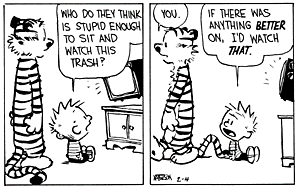 A portrait of your blogger as a young man In general, the consensus seems to be that TV has improved technically and in its ability to cover news and sports, but that the overall quality is either stagnant or has actually gone down. Vidal sees television with an "enthusiastic commitment" to producing junk, while Shulman blames a lack of talented writers and interference from network executives, and Baskin describes programming as "essentially pap." All bemoan the loss of live drama and anthology, and agree that there are too many commercials and too much pressure from advertisers (Halsman has the kindest word, saying that today's commercials "are now often more original and visually exciting than the shows they sponsor."), and Schulz talks of the need for the "artist to be able to record his work without its being torn apart and put together again by a host of others in authority." When asked what TV needs for the future, there are few surprises. The comedian Morgan would like more sketch comedy, comedy specials and comedy dramas; the musician Welk would like music "well played and in good taste"; the artist Baskin longs for the elimination of advertising, the novelist and historian Dos Passos would like more non-partisan news and analysis. Vidal comments acidly (and correctly) that television needs "a sense that getting people to buy things they do not need is morally indefensible," and Halsman looks back with nostalgia "of the time laughter came out of me and not out of a can."
A portrait of your blogger as a young man In general, the consensus seems to be that TV has improved technically and in its ability to cover news and sports, but that the overall quality is either stagnant or has actually gone down. Vidal sees television with an "enthusiastic commitment" to producing junk, while Shulman blames a lack of talented writers and interference from network executives, and Baskin describes programming as "essentially pap." All bemoan the loss of live drama and anthology, and agree that there are too many commercials and too much pressure from advertisers (Halsman has the kindest word, saying that today's commercials "are now often more original and visually exciting than the shows they sponsor."), and Schulz talks of the need for the "artist to be able to record his work without its being torn apart and put together again by a host of others in authority." When asked what TV needs for the future, there are few surprises. The comedian Morgan would like more sketch comedy, comedy specials and comedy dramas; the musician Welk would like music "well played and in good taste"; the artist Baskin longs for the elimination of advertising, the novelist and historian Dos Passos would like more non-partisan news and analysis. Vidal comments acidly (and correctly) that television needs "a sense that getting people to buy things they do not need is morally indefensible," and Halsman looks back with nostalgia "of the time laughter came out of me and not out of a can."In many ways, we could be having this conversation today. You'd see some of the same complaints about commercials and commercialism, you'd read comments about a need for more serious (and non-partisan) coverage of the news, you'd hear calls for more creativity and less interference. And yet this isn't really a situation where we look back at an era that was never as good as we thought it was, one that's been burnished by time. For those who know television history, one could indeed say that by 1964, the decline of TV from the Golden Age was well under way. Anthologies, the lifeblood of early television, were mostly gone, being replaced by sitcoms such as The Beverly Hillbillies—shows that, fairly or unfairly (and in the case of Hillbillies, I think the latter).
In retrospect, of course, many of these shows—from Hillbillies and other sitcoms like The Addams Family, Ozzie & Harriet, and more—to programs such as The Man From U.N.C.L.E., Combat!, Burke's Law, The Bell Telephone Hour, Mr. Novak, The Defenders, The Fugitive, Slattery's People—are either critically acclaimed or fondly remembered. True, those critics from 1964 might reply that this says more, and not in a positive way, about our own tastes, but with the benefit of looking back, perhaps things weren't quite as bad as they seemed. Maybe the "new" shows didn't quite measure up to those of the past, maybe collective audience tastes were diminishing, but how many of us wouldn't gladly exchange them for what we have today?
l l l
Speaking of the sitcom (dumbed down or not), word on the street (or at least from TV Teletype) is that "Producers of Gilligan's Island are looking for three more regulars to co-star in the new comedy with Bob Denver, Alan Hale, Jim Backus and Natalie Schafer." hose three would turn out to be Tina Louise, Russell Johnson and Dawn Wells. I don't know that I'd ever have considered myself a big fan of Gilligan, but I liked most of those people on it. And, as we read in books like Paul Cantor's Gilligan Unbound: Pop Culture in the Age of Globalization , Gilligan has a lot more to tell us than those critics back in the day might have thought.
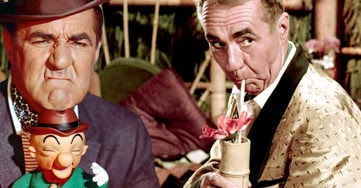 There's also a note about some of the stories planned next season for The Famous Adventures of Mr. Magoo, and all this reminds me that these two shows were on opposite each other for Gilligan's first season, meaning that Jim Backus, the voice of Magoo, is the first—and, I think, the only—person in the history of television to appear on two different shows on two different networks on the same day and at the same time. He was, essentially, competing with himself, playing two distinct, and beloved, characters. Hard to imagine that nowadays.
There's also a note about some of the stories planned next season for The Famous Adventures of Mr. Magoo, and all this reminds me that these two shows were on opposite each other for Gilligan's first season, meaning that Jim Backus, the voice of Magoo, is the first—and, I think, the only—person in the history of television to appear on two different shows on two different networks on the same day and at the same time. He was, essentially, competing with himself, playing two distinct, and beloved, characters. Hard to imagine that nowadays.I'd tell you more of the Teletype news from New York, but that's one of the pages ripped out of this issue. Someone thought a coupon for Kraft mustard was more important. They were probably right.
Keeping with industry news, the 1963 Emmy Award nominations have just been announced. The categories are a bit different from what we're used to today; in addition to best comedy, drama and variety series, there's an award for "the best program of the year." The nominees are "Blacklist," an episode from the CBS drama The Defenders (also nominated for best drama); a news special, "Town Meeting of the World" (CBS); and three documentaries: American Revolution of '63 (NBC), The Kremlin (NBC), and The Making of the President 1960 (ABC). Not surprisingly, "Making of the President" won, and while it would have been very difficult not to vote for a program about the election of a man who had been dead for six months, I think that on the whole, it probably won on its own merits. As I mentioned in this space last week, documentaries that are well done are very good.
l l l
Continuing on this theme, a look at a couple of medical dramas posing provocative questions for the viewer.
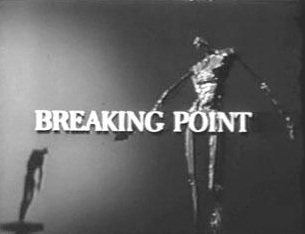 In 1964, there are two major medical series on television: Ben Casey on ABC, and Dr. Kildare on NBC. The shows are quite different in many ways, but they share a similar structure, that of a young doctor paired up with an older mentor (Vincent Edwards and Sam Jaffe on Casey, Richard Chamberlain and Raymond Massey on Kildare.) They've also spawned similar shows about psychiatrists: Breaking Point, which spun off from Casey, featured Paul Richards and Eduard Franz as the junior and senior psychiatrists, while Kildare's companion*, The Eleventh Hour, had Wendell Corey (first season) and Ralph Bellamy (second season; there's also a pretty good article about him in this edition by Richard Warren Lewis) as the elder doctor, and Jack Ging as the young psychologist.
In 1964, there are two major medical series on television: Ben Casey on ABC, and Dr. Kildare on NBC. The shows are quite different in many ways, but they share a similar structure, that of a young doctor paired up with an older mentor (Vincent Edwards and Sam Jaffe on Casey, Richard Chamberlain and Raymond Massey on Kildare.) They've also spawned similar shows about psychiatrists: Breaking Point, which spun off from Casey, featured Paul Richards and Eduard Franz as the junior and senior psychiatrists, while Kildare's companion*, The Eleventh Hour, had Wendell Corey (first season) and Ralph Bellamy (second season; there's also a pretty good article about him in this edition by Richard Warren Lewis) as the elder doctor, and Jack Ging as the young psychologist. *Not technically a spinoff, but since it was originally conceived as an episode of Kildare, we'll count it.
Each of these series features plotlines this week that I think would be told differently were they on TV today. In Breaking Point (Tuesday, 9:00 p.m. CT, ABC), the subject is autism, in the story "And James Was a Very Small Snail." Autism wasn't a very well-known or understood condition in 1964, so the material was probably much fresher than it would be today. Dr. Thompson's (Richards) small patient is seven-year-old Petey Babcock, whose only means of communication with his therapist is through a crayon. Thompson's burden is to convince Petey's parents and older brother that Petey's only chance at making progress is if he remains at the clinic. Meanwhile, later that week, The Eleventh Hour (Wednesday, 9:00 p.m., NBC) presents "This Wonderful Madman Calls Me 'Beauty," the story of a biochemist recently diagnosed with a brain tumor, who wants to forego treatment until he's concluded his research on isolating a life-prolonging enzyme, work that he feels is on the threshold of success.
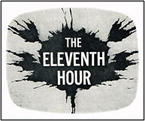 In each of these episodes, we're presented with something of an existential dilemma that in my opinion would be missed by today's television. Kenneth Newell, the biochemist in Eleventh Hour, is emblematic of a man driven to succeed, so much so that he's willing to jeopardize his own life in the quest for an answer that may save many other lives. Not having seen the episode, I can't say for sure whether or not Newell acts from ego or altruism, which I suppose is why it's being told on a drama about psychiatrists instead of brain surgeons, but at the very least there's a potential for a real philosophical debate about the meaning of life and whether or not Newell's potential breakthrough is more important for him that to simply preserve his own life.
In each of these episodes, we're presented with something of an existential dilemma that in my opinion would be missed by today's television. Kenneth Newell, the biochemist in Eleventh Hour, is emblematic of a man driven to succeed, so much so that he's willing to jeopardize his own life in the quest for an answer that may save many other lives. Not having seen the episode, I can't say for sure whether or not Newell acts from ego or altruism, which I suppose is why it's being told on a drama about psychiatrists instead of brain surgeons, but at the very least there's a potential for a real philosophical debate about the meaning of life and whether or not Newell's potential breakthrough is more important for him that to simply preserve his own life.Breaking Point is, I think, even more fertile ground. Today this story would be on a legal show (something like The Good Wife, probably), debating the legal rights of the family vs. the health of Petey, not to mention the various theories on the causes of autism, hotly debated today, which cause nary a ripple in the water in this episode. All this, I think, overlooks the heart of the drama: the mystery of existence, the depth of the human mind, the dynamics of family relationships, what "quality of life" really means. It's handled sensitively and effectively, with understanding for all concerned: the doctors, the family, and Petey himself. I thought it was very well done, even considering that Breaking Point is a favorite show of mine.
I should add that this week's drama isn't confined to medical shows; this week, the legal drama The Defenders (Saturday, 7:30 p.m., CBS) presents James Coburn in "The Man Who Saved His Country." Coburn plays Earl Chaffee, an ordinary man who becomes an overnight celebrity after killing a man in self defense. The man just happens to be a top Cuban communist, traveling around the country incognito. A lot of people, the Prestons discover, have a stake in this case—including the Federal government. The question persists: does Chaffee automatically become a hero for acting in self-defense, even though he didn't know the man he killed was a communist? And does it matter that Chaffee wasn't even aware of it at the time? Is someone justified in killing a person who "deserves" killing, regardless of the circumstances motivating the killing? You can see how this can lead to other questions, other scenarios, even ones that aren't part of the specific story.
My point here is that these shows, and ones like them, are what I'd call idea shows. These aren't prime time soaps, serialized dramas, or shows featuring explicit violence or sex. Whether by design or not, their stories contain themes and plot points that can be thought about, discussed, debated. One of the themes that ran through last week's lead story on documentaries is the importance of packaging, of acknowledging "the dramatic composition to life." The existential point of the story doesn't have to be dull. Neither does scripted drama. And viewers don't have to be afraid of it, either.
l l l
If I haven't put you to sleep completely with that last section, a brief mention of this week's cover story should be a good way to wrap things up. Combat! was not only the best of World War II dramas of the 1960s, it was one of television's best dramas, period, a gritty, realistic portrayal of an American squad of troops working their way across Europe following D-Day. (It also didn't hurt that all but the last season was done in black and white.) The stars, Vic Morrow and Rick Jason, more or less alternated leads each week, though they also could appear together in stories. Morrow is probably the better known of the two, but Jason was thought by many to be the likely star of the series when it began, and he's the focus of this week's unbylined cover story.
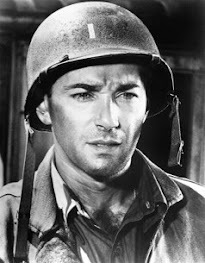 The portrait of Jason we're given reminds me a bit of a
similar profile of Jack Lord
that was done a year and a half ago; both come across as men trying just a little too hard to show everyone what Renaissance men they are. In Jason's case, it's how he prides himself on sculpting, painting, woodworking, leathercraft, carpentry, plumbing, landscaping, cooking, photography, dog training, fish breeding, guitar playing, singing, writing, bridge, chess, hunting, fishing, underwater swimming, and karate, in addition to starring in a weekly hour drama. He also reads "everything from Aristotle and Plato to Henry Miller," pilots an airplane, and speaks Spanish, French, Italian and Chinese. Makes me tired just to type that.
The portrait of Jason we're given reminds me a bit of a
similar profile of Jack Lord
that was done a year and a half ago; both come across as men trying just a little too hard to show everyone what Renaissance men they are. In Jason's case, it's how he prides himself on sculpting, painting, woodworking, leathercraft, carpentry, plumbing, landscaping, cooking, photography, dog training, fish breeding, guitar playing, singing, writing, bridge, chess, hunting, fishing, underwater swimming, and karate, in addition to starring in a weekly hour drama. He also reads "everything from Aristotle and Plato to Henry Miller," pilots an airplane, and speaks Spanish, French, Italian and Chinese. Makes me tired just to type that.The typically unnamed friend concedes that Jason probably does "most, if not all, of these things" but adds that "he's not as much of an expert as he'd like you to think." His first wife (of three, one of whom Jason says he wasn't legally married to at all) says "he is very handy—but he never finishes anything." Like Lord, he's seen as something of a throwback to Hollywood's larger-than-life stars of its glamorous past; "Vic is more of an actor," another unnamed source says, "Rick is a star." But whereas Jack Lord clearly rubs some people the wrong way, Rick Jason is inherently more likable, with "a naiveté which might leave him open to ridicule were it not for his very guilelessness."
Hidden behind that façade, though, one suspects that sadness lurks; Jason himself says that "I enjoy being an actor because I can stop being me. Like many actors, I don't particularly like myself." His parents never really accepted or acknowledged his success in acting, and for all the various activities he say he's engaged in, acting appears to be what really matters. "I can't remember ever wanting to be anything but an actor," he says.
As Combat! progressed through its five seasons, Morrow came to be perceived as the face of the series; although Jason still received top billing every other episode, more and more of the stories focused on his character, and he wound up directing seven episodes in addition. Jason is philosophical about it all: "If those are the conditions that prevail, I won't chafe under them. I can't say I have any complaints about this business." The two actors bring different strengths to their episodes; it's really impossible to say that the series could have survived for five seasons without each one of them bringing his own particular talent to the story. Combat! is a show that has aged well, primarily because it combines the storylines of a period piece with the eternal truths of the human condition, making for an intense, gritty, occasionally heartrending series. Perhaps it isn't part of the top ten, but it's very close.
However, I can promise that after I've watched an episode featuring Rick Jason, I've had no particular desire to get up and do some woodworking, fix the plumbing, whip up a gourmet meal, train a dog, study Chinese, . . .TV
Published on May 11, 2024 05:00
It's About TV!
Insightful commentary on how classic TV shows mirrored and influenced American society, tracing the impact of iconic series on national identity, cultural change, and the challenges we face today.
- Mitchell Hadley's profile
- 5 followers



